
Journal Menu
► ▼ Journal Menu-
- Viruses Home
- Aims & Scope
- Editorial Board
- Reviewer Board
- Topical Advisory Panel
- Instructions for Authors
- Special Issues
- Topics
- Sections & Collections
- Article Processing Charge
- Indexing & Archiving
- Editor’s Choice Articles
- Most Cited & Viewed
- Journal Statistics
- Journal History
- Journal Awards
- Society Collaborations
- Conferences
- Editorial Office
Journal Browser
► ▼ Journal BrowserNeed Help?
Announcements
5 November 2024
Viruses | World HTLV Day
November 10th marks the World HTLV Day, commemorated by international HTLV community and stakeholders, and WHO aims to take this opportunity to reaffirm its commitment to this virus, to engage with stakeholders, strengthen the response, and amplify awareness about HTLV. Below are some papers published in Viruses (ISSN: 1999-4915) that may be of interest to you.
“Efficacy of Corticosteroid Therapy for HTLV-1-Associated Myelopathy: A Randomized Controlled Trial (HAMLET-P)”
by Junji Yamauchi, Kenichiro Tanabe, Tomoo Sato, Masanori Nakagawa, Eiji Matsuura, Yoshio Tsuboi, Keiko Tamaki, Hirokuni Sakima, Satoshi Ishihara, Yuki Ohta et al.
Viruses 2022, 14(1), 136: https://doi.org/10.3390/v14010136
Available online: https://www.mdpi.com/1999-4915/14/1/136

“Updates on HTLV-1 Uveitis”
by Koju Kamoi, Toshiki Watanabe, Kaoru Uchimaru, Akihiko Okayama, Seiko Kato, Toyotaka Kawamata, Hisako Kurozumi-Karube, Noe Horiguchi, Yuan Zong, Yoshihisa Yamano et al.
Viruses 2022, 14(4), 794: https://doi.org/10.3390/v14040794
Available online: https://www.mdpi.com/1999-4915/14/4/794

“Human Retrovirus Genomic RNA Packaging”
by Heather M. Hanson, Nora A. Willkomm, Huixin Yang and Louis M. Mansky
Viruses 2022, 14(5), 1094: https://doi.org/10.3390/v14051094
Available online: https://www.mdpi.com/1999-4915/14/5/1094

“Co-Infection and Cancer: Host–Pathogen Interaction between Dendritic Cells and HIV-1, HTLV-1, and Other Oncogenic Viruses”
by Tania H. Mulherkar, Daniel Joseph Gómez, Grace Sandel and Pooja Jain
Viruses 2022, 14(9), 2037: https://doi.org/10.3390/v14092037
Available online: https://www.mdpi.com/1999-4915/14/9/2037

“Does HTLV-1 Infection Show Phenotypes Found in Sjögren’s Syndrome?”
by Hideki Nakamura, Masako Tsukamoto, Yosuke Nagasawa, Noboru Kitamura, Toshimasa Shimizu, Atsushi Kawakami, Kinya Nagata and Masami Takei
Viruses 2022, 14(1), 100: https://doi.org/10.3390/v14010100
Available online: https://www.mdpi.com/1999-4915/14/1/100

“Clonal Selection and Evolution of HTLV-1-Infected Cells Driven by Genetic and Epigenetic Alteration”
by Makoto Yamagishi, Yutaka Suzuki, Toshiki Watanabe and Kaoru Uchimaru
Viruses 2022, 14(3), 587: https://doi.org/10.3390/v14030587
Available online: https://www.mdpi.com/1999-4915/14/3/587

“Effect of HTLV-1 Infection on the Clinical Course of Patients with Rheumatoid Arthritis"
by Kunihiko Umekita
Viruses 2022, 14(7), 1460: https://doi.org/10.3390/v14071460
Available online: https://www.mdpi.com/1999-4915/14/7/1460

“Exploring New Functional Aspects of HTLV-1 RNA-Binding Protein Rex: How Does Rex Control Viral Replication?”
by Kazumi Nakano, Koichi Yokoyama, Shuichi Shin, Koki Uchida, Kazuki Tsuji, Marie Tanaka, Kaoru Uchimaru and Toshiki Watanabe
Viruses 2022, 14(2), 407: https://doi.org/10.3390/v14020407
Available online: https://www.mdpi.com/1999-4915/14/2/407

5 November 2024
MDPI INSIGHTS: The CEO's Letter #17 - OA Week, Basel Open Day, Beijing Graphene Forum

Welcome to the MDPI Insights: The CEO's Letter.
In these monthly letters, I will showcase two key aspects of our work at MDPI: our commitment to empowering researchers and our determination to facilitating open scientific exchange.
Opening Thoughts

Open Access Week: Forging the Future of Open Access through Global Reach and Collaboration
From 21 to 27 October, we celebrated International Open Access Week (OAW), highlighting the importance of making research accessible to everyone. This campaign reinforced our commitment to advancing open access (OA) and showcased how we are helping research communities worldwide adopt OA as their standard.
“OA publishing is now a cornerstone of global research”
Throughout the week, we featured MDPI’s efforts to support quality open research through blog posts on topics such as how Research Integrity Promotes OA Practices, our Preprints.org platform, and supporting societies with different OA models. These initiatives capture our commitment to making research more inclusive and accessible to all.
OA publishing is now a cornerstone of global research, with more researchers choosing OA over traditional paywalled models, and embracing new, community-driven models.
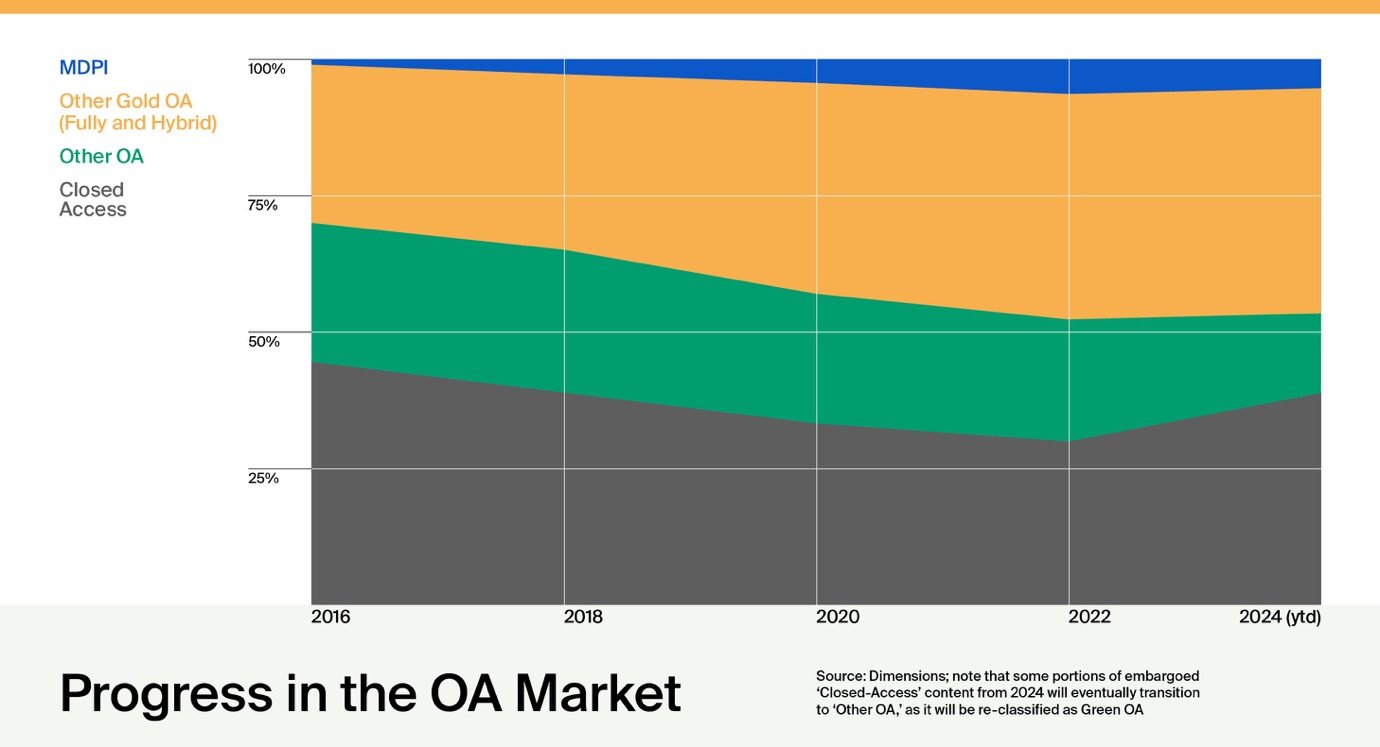
Benefits of Open Access and Open Research
- Accelerated Discoveries: OA speeds up scientific progress by allowing immediate access to findings, enabling researchers to build on each other’s work faster.
- Community-Led Innovation: Open research empowers communities to manage their own platforms, creating collaboration and shared knowledge.
- Increased Visibility: OA broadens the reach of your research, leading to greater recognition, collaboration, and impact.
- Cross-Disciplinary Connections: By removing financial and geographical barriers, OA unites diverse fields, sparking innovation across disciplines.

MDPI Singapore Celebrates Open Access Week
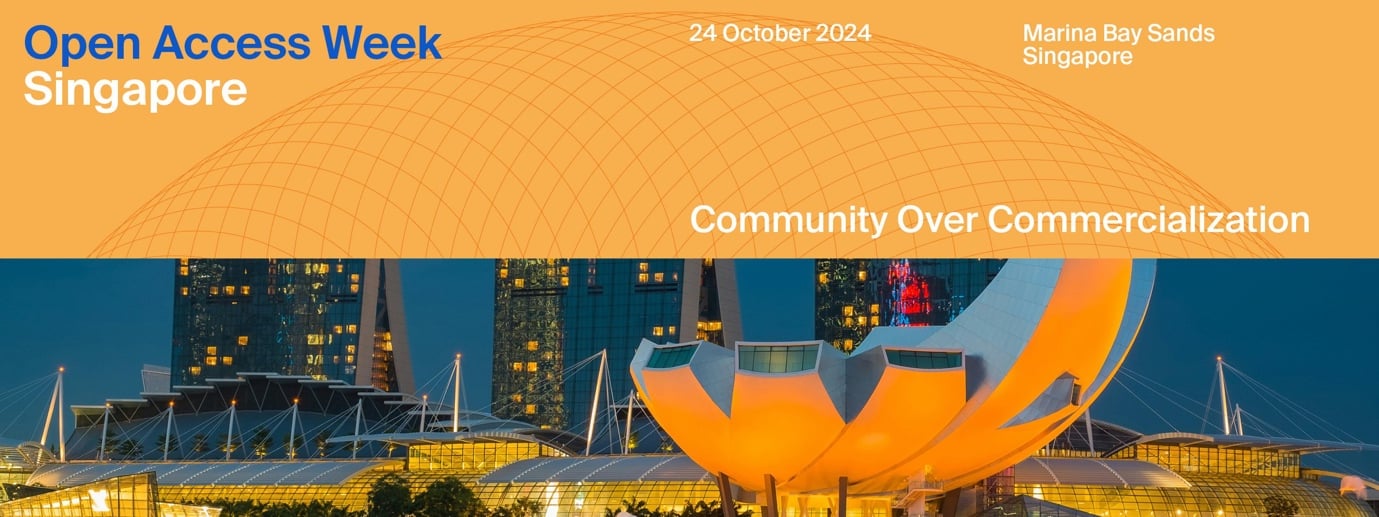
MDPI Singapore also hosted its first-ever OAW event at the Marina Bay Sands Convention Centre, bringing together academics, researchers, and students to discuss the future of open scholarship. Conversations focused on the potential of new publishing models, alternative funding strategies, and the importance of communicating research to wider audiences.
As OA evolves, MDPI remains a committed partner in advancing open science and creating a transparent, inclusive research environment. For a full recap of the week’s highlights and resources, visit our campaign page.

Impactful Research

MDPI Connection to Nobel-Winning Protein Research
David Baker, an American biochemist, and Demis Hassabis and John M. Jumper, two scientists from Google DeepMind, have been awarded the 2024 Nobel Prize in Chemistry for their groundbreaking advancements in better understanding the structure of proteins, the molecular engines of life’s processes.
One half of the prize was awarded to Professor David Baker from the University of Washington for his development of revolutionary protein design software enabling the creation of novel proteins for vaccines, nanomaterials, and sensors. Prof. Baker co-authored a 2016 paper in MDPI’s Toxins journal on protein-based therapeutics.
Meanwhile, DeepMind’s Demis Hassabis and John M. Jumper received recognition for AlphaFold, the AI model that predicts protein structures from amino acid sequences, fulfilling a long-held scientific dream.
“We congratulate this year’s Nobel laureates for their groundbreaking contributions to the study of life”
Nobel Prize Laureates Entrust MDPI with Their Research
As at October 2024, 45 Nobel laureates had contributed to more than 115 articles across
35 MDPI journals. The privilege of hosting the research of such contributors, who significantly influence the open access movement, resonates deeply with our editorial teams.
We are proud to list the names of Pierre Agostini, Hiroshi Amano, Werner Arber, Aaron Ciechanover, Robert H. Grubbs, Oliver Hart, Gerard ‘t Hooft, Michael Houghton, Harald zur Hausen, Katalin Karikó, Jean-Marie Lehn, Gérard Mourou, Ferid Murad, Shuji Nakamura, William Nordhaus, Kostya S. Novoselov, Giorgio Parisi, Charles M. Rice, Alvin E. Roth, Donna Strickland, K. Barry Sharpless, George F. Smoot, Anne L’Huillier, Drew Weissman, Kurt Wüthrich, Ada Yonath, Tomas Lindahl, Thomas C. Südhof, Stanley B. Prusiner, Roger Kornberg, Robert F. Engle, Richard J. Roberts, Ōmura Satoshi, Kenneth J. Arrow, John B. Goodenough, Jennifer Doudna, Hamilton Othanel Smith, Eric R. Kandel, Carlo Rubbia, Bernard Feringa, Barry J. Marshall, Anthony J. Leggett, Andrew Victor Schally, and David Baker.
Notable MRNA Published in Cells
On 7 October 2024, the 2024 Nobel Prize in Physiology or Medicine was jointly awarded to Victor Ambros and Gary Ruvkun for the discovery of microRNA and its role in post-transcriptional gene regulation.
MicroRNAs are proving to be fundamentally important for how organisms develop and function. Some interesting papers about microRNA research are published in the MDPI journal Cells. I invite you browse through the notable papers related to microRNA research in Cells.
Inside MDPI
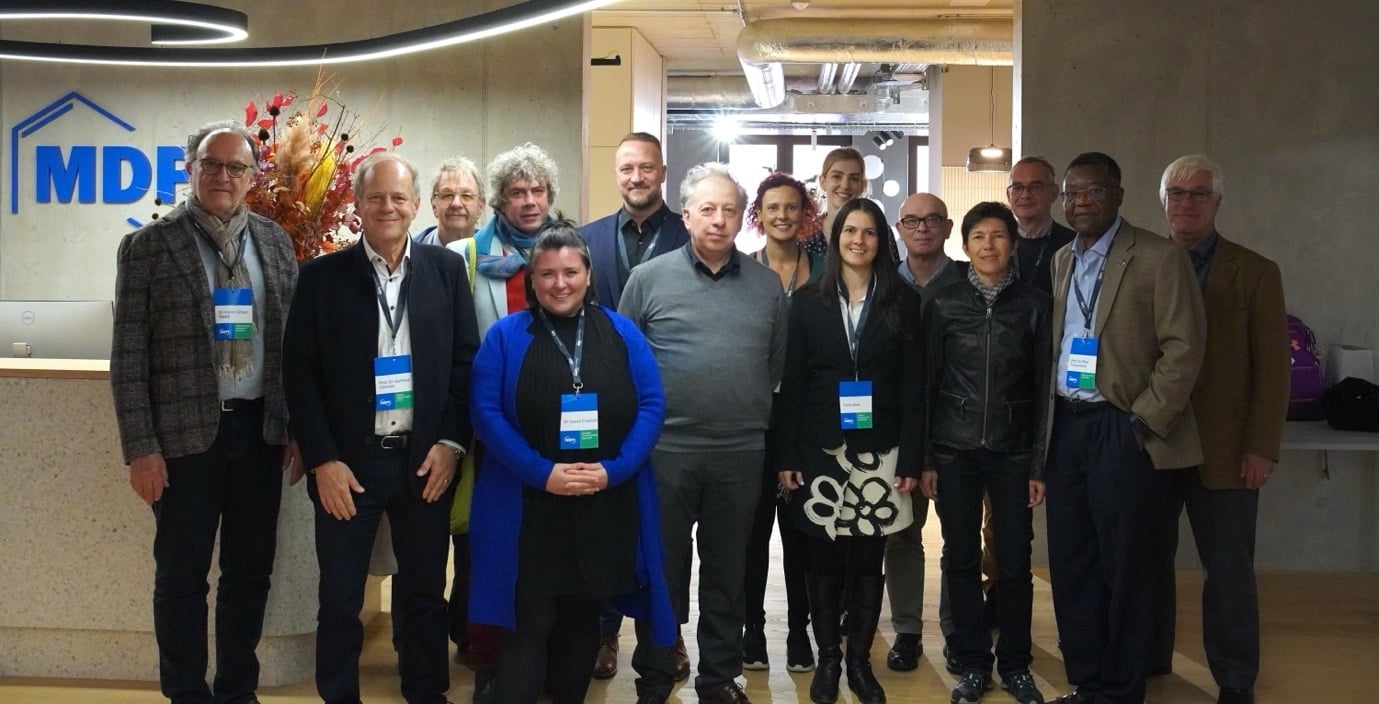
Basel Open Day
On 21 October, we held the Basel Open Day at our headquarters, welcoming a group of journal Editors-in-Chief (EiC) and Editorial Board Members (EBMs) for a full-day workshop. The event featured presentations and discussions on MDPI’s latest editorial updates, data integrity policies, society collaborations, and local market insights.
The following MDPI journals were represented during the visit: Physics, Journal of Personalized Medicine (JPM), Sci, Remote Sensing, Animals, Cells, Buildings, Histories, Sensors, and International Journal of Environmental Research and Public Health (IJERPH).
This was a great opportunity to showcase our new office space while gathering feedback from leading journal stakeholders. To get everyone on the same page, we took 60 minutes for round-table introductions, which helped set a collaborative tone and ground us in MDPI’s mission of disseminating open science.
“This was a great opportunity to gather feedback from leading journal stakeholders”
The general feedback from the day highlighted positive developments around our editorial and ethics policies, as well as areas for improvement, including flexibility regarding reviewer deadlines. There was a genuine appreciation and push for our ongoing efforts to share more about MDPI, including company updates and promoting high-quality research through our blog, announcements, and social media channels, which we have been growing and expanding.
Our Basel Open Day was a positive experience, bringing together key journal stakeholders and gathering insights to guide MDPI’s continued engagement with the academic community. We look forward to hosting future events of this kind and welcoming more scholars to our headquarters in Basel, Switzerland.
Coming Together for Science

ncRNA 2024 Conference in Basel
I am pleased to share that we held Non-coding RNA World 2024: Exploring Mechanisms, Designing Medicines (ICM 2024) in Basel, Switzerland this past 7–9 October.
The three-day event attracted just over 100 attendees, including two Chairs, 10 invited speakers and two keynotes from Prof. Mauro Giacca and Prof. Ling-Ling Chen. Of the presentations on site, there were 35 posters and 44 oral presentations.
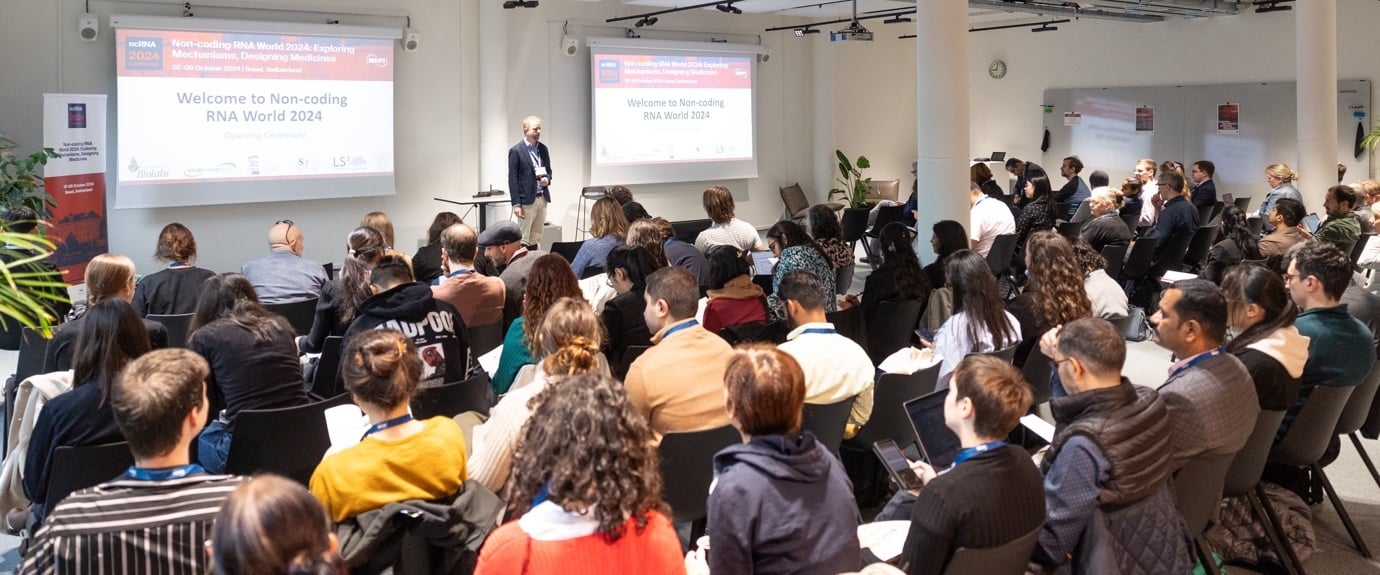
The overall feedback was positive, with people enjoying the intimate event and the unique activities offered, including a guided tour around Basel’s Old Town (a must-see for anyone visiting the city) and a memorable conference dinner.

It was cool to see the winners of the 2024 Nobel Prize in Physiology or Medicine announced during the conference days. This was exciting for attendees, as the winners discovered a new class of RNA molecules (miRNAs). As one invited speaker put it, “It's exciting to be among fellows when something that important for the field is announced.”
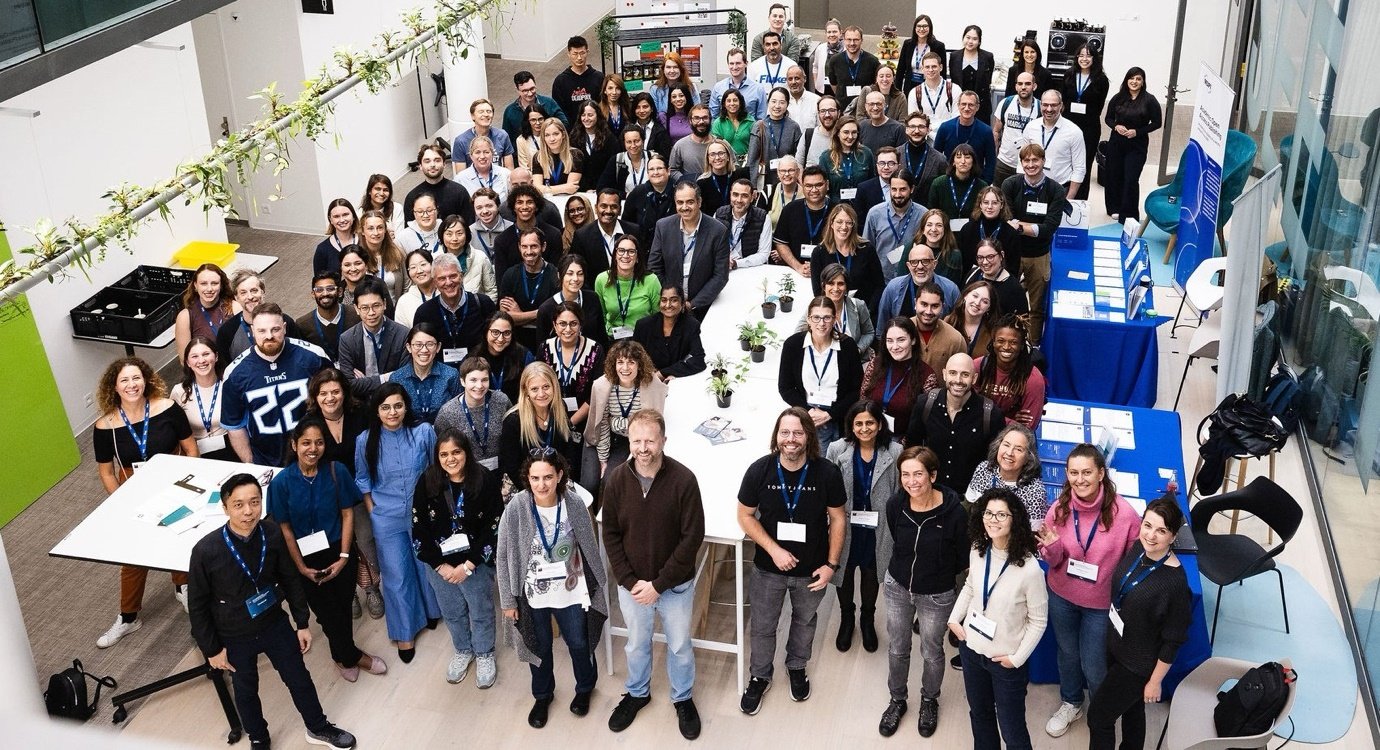
“It's exciting to be among fellows when something that important for the field is announced”
Every attendee receives a conference survey, and I’m always pleased to see a high percentage of ‘Very Satisfied’ responses when asked about ‘treatment from conference personnel’. Kudos to our conference team for meeting our attendees’ needs. These events are a great opportunity for us to reach new audiences, as 92% of the respondents had never been to an MDPI conference, so I am thrilled to see us connecting with a new demographic of your researchers in the RNA field.
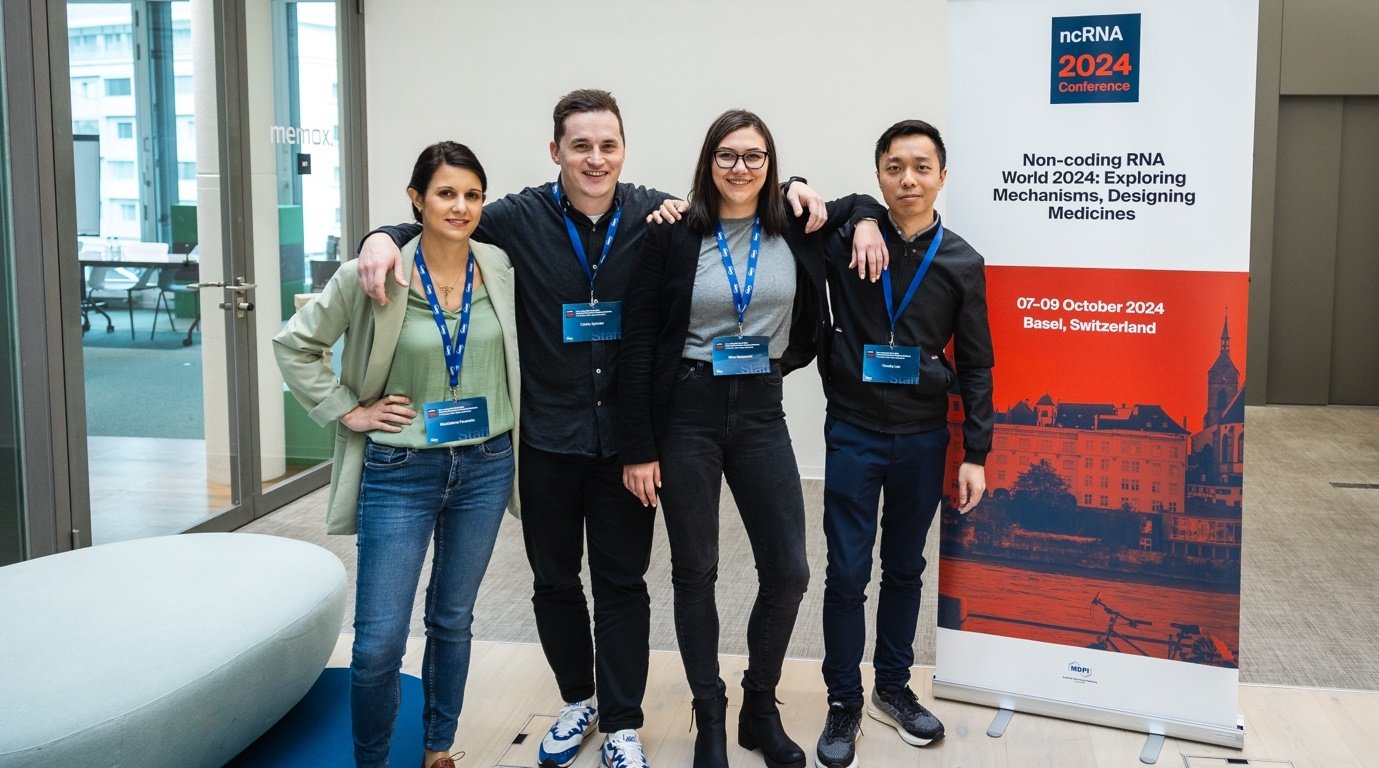
A special thank-you to our partnering societies The Epigenetics Society, The French Society of Genetics, LS2 / USGEB (Union of Swiss Societies for Experimental Biology), and The RNA Biology Group, as well as to our sponsors New England Biolabs and Arraystar for their support of the ncRNA 2024 conference. I am also pleased to report that we presented two awards, including the Best Presentation Award and two Best Poster Award, recognizing the contributions of our participants.
Upcoming In-Person Event

27–29 November 2024
Pharmaceuticals 2024 – Recent Advances in Pharmaceutical Sciences Towards a Healthy Life
Location: Barcelona, Spain
The discovery of new molecules, their properties, and actions to enhance human health and quality of life.
Find more upcoming MDPI events here.
Closing Thoughts

Beijing Graphene Forum 2024
I am pleased to share that we had a successful time at the Beijing Graphene Forum 2024, which drew around 1,000 attendees, including Konstantin Novoselov (2015 Nobel Prize in Physics) and other high-profile scholars in materials science and chemistry. It was a great opportunity to present MDPI on the big stage, with university presidents from institutions such as Peking University also in attendance.
I had the honour of awarding Prof. Zhongfan Liu, Chairman of the Chemical Science Committee, with a medal and presenting certificates to the members of the Chemical Science Committee; this is an important initiative to help expand MDPI’s journals and influence in China. These are highly respected scholars, and we enjoyed connecting with them over lunch as well.
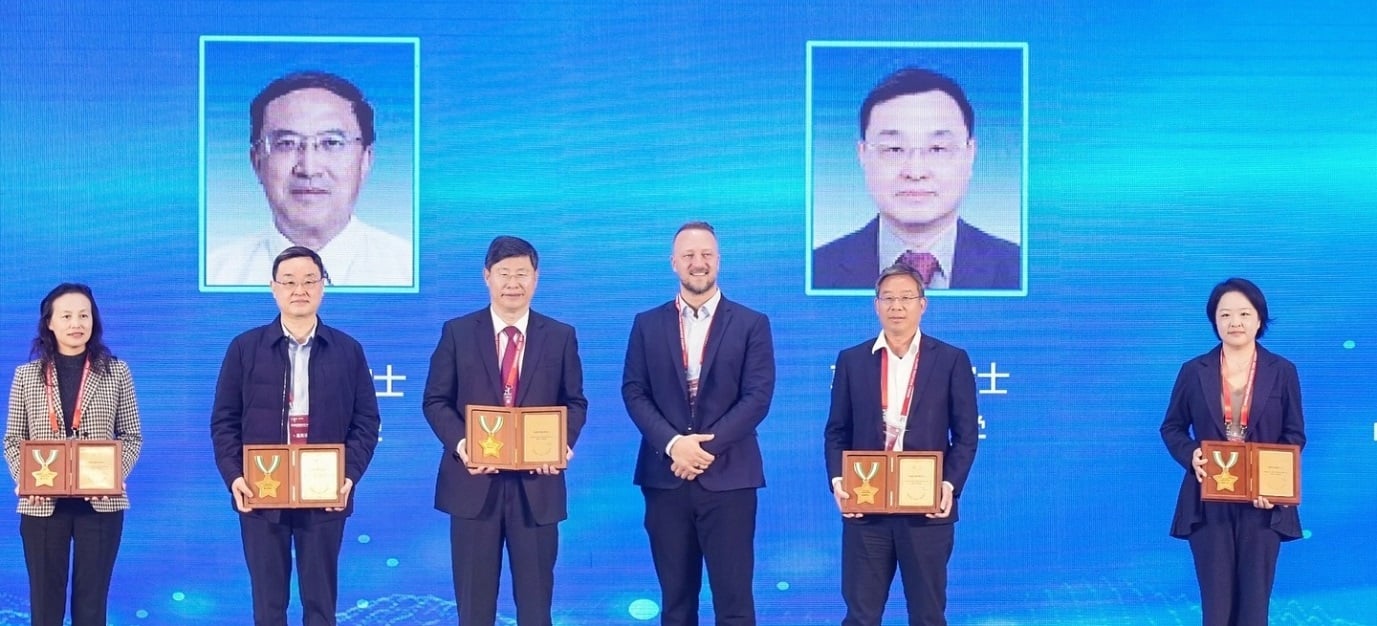
“This is an important initiative to help expand MDPI’s journals and influence in China”
I also had the chance to speak about MDPI and open access, giving a five-minute speech during the opening ceremony and a 20-minute presentation at the close. MDPI hosted a sub-forum where both academic scholars and MDPI members shared insights, and we engaged with attendees at our MDPI booth.
This was a great opportunity to spotlight MDPI as the main publishing partner for the event, and I was proud to represent us on stage. We also met with scholars to discuss topics such as their publishing needs and institutional policies, open access, impact journals, and IOAP.
Chief Executive Officer
MDPI AG
28 October 2024
Viruses | Editor’s Choice Articles from 2022 to 2023 Related to Viral Immunology, Vaccines, and Antivirals
“IFITM3 Interacts with the HBV/HDV Receptor NTCP and Modulates Virus Entry and Infection”
by Massimo Palatini, Simon Franz Müller, Michael Kirstgen, Silke Leiting, Felix Lehmann, Lena Soppa, Nora Goldmann, Christin Müller, Kira Alessandra Alicia Theresa Lowjaga et al.
Viruses 2022, 14(4), 727; https://doi.org/10.3390/v14040727
Available online: https://www.mdpi.com/1999-4915/14/4/727

“Expression of a Functional Mx1 Protein Is Essential for the Ability of RIG-I Agonist Prophylaxis to Provide Potent and Long-Lasting Protection in a Mouse Model of Influenza A Virus Infection”
by Lara S. U. Schwab, Fernando Villalón-Letelier, Melkamu B. Tessema, Sarah L. Londrigan, Andrew G. Brooks, Aeron Hurt, Christoph Coch, Thomas Zillinger, Gunther Hartmann and Patrick C. Reading
Viruses 2022, 14(7), 1547; https://doi.org/10.3390/v14071547
Available online: https://www.mdpi.com/1999-4915/14/7/1547

“Pteropus vampyrus TRIM40 Is an Interferon-Stimulated Gene That Antagonizes RIG-I-like Receptors”
by Sarah van Tol, Adam Hage, Ricardo Rajsbaum and Alexander N. Freiberg
Viruses 2023, 15(11), 2147; https://doi.org/10.3390/v15112147
Available online: https://www.mdpi.com/1999-4915/15/11/2147

“A Robust Phenotypic High-Throughput Antiviral Assay for the Discovery of Rabies Virus Inhibitors”
by Xinyu Wang, Winston Chiu, Hugo Klaassen, Arnaud Marchand, Patrick Chaltin, Johan Neyts and Dirk Jochmans
Viruses 2023, 15(12), 2292; https://doi.org/10.3390/v15122292
Available online: https://www.mdpi.com/1999-4915/15/12/2292

”The Functional Implications of Broad Spectrum Bioactive Compounds Targeting RNA-Dependent RNA Polymerase (RdRp) in the Context of the COVID-19 Pandemic”
by Brittany A. Comunale, Robin J. Larson, Erin Jackson-Ward, Aditi Singh, Frances L. Koback and Lilly D. Engineer
Viruses 2023, 15(12), 2316; https://doi.org/10.3390/v15122316
Available online: https://www.mdpi.com/1999-4915/15/12/2316

16 October 2024
MDPI's Newly Launched Journals in September 2024
Five new journals covering a diverse range of subjects launched their inaugural issue in September 2024. Like other journals in MDPI’s portfolio, these journals are dedicated to sharing the latest research through open access, reflecting our commitment to making knowledge accessible to all.
We extend our sincere gratitude to the Editorial Board Members for their dedication to the launch and development of our new journals. Each journal will ensure its high-quality output via excellent editorial and rigorous peer-review processes so that the published articles achieve significant impact and broad visibility.
We invite you to explore and learn more about these new journals below.
| Journal | Founding Editor-in-Chief | Journal Topics (Selected) |
| Prof. Dr. Nejat Düzgüneş, University of the Pacific, USA | Editorial | view inaugural issue | biological therapy and stem-cell therapy; drug therapy; chemotherapy; radiation and other nonsurgical therapeutic strategies | view journal scope | submit an article | |
| Prof. Dr. Magda Tsolaki, Greek Federation of Alzheimer’s Disease, Greece; Aristotle University of Thessaloniki, Greece | Editorial | view inaugural issue | surgical/procedural complications; complications; perioperative adverse events; postoperative adverse events | view journal scope | submit an article | |
| Prof. Dr. Steven R. Fassnacht, Colorado State University, USA; Cooperative Institute for Research in the Atmosphere, USA | Editorial | view inaugural issue | ice as a mineral; atmospheric ice; sea ice; freshwater ice; ice sheets; ice caps and ice shelves | view journal scope | submit an article | |
| Dr. Francisco Epelde, Hospital Universitari Parc Tauli, Spain; University Autonoma of Barcelona, Spain | Editorial | view inaugural issue | hospital management; hospital facilities; hospital services; hospital risk management; health law | view journal scope | submit an article | |
| Prof. Dr. Nicola Ferri, University of Padova, Italy | Editorial | view inaugural issue | lipids in cells and whole organisms; lipid structure and function; lipid products and processes; dietary lipids and nutrition | view journal scope | submit an article |
We wish to thank everyone who has supported the development of open access publishing. You are welcome to send an application here or contact the New Journal Committee (newjournal-committee@mdpi.com) if you would like to create more new journals.
11 October 2024
Viruses | Editor’s Choice Articles from 2022 to 2023 Related to Human Virology and Viral Diseases
“Efficacy of Corticosteroid Therapy for HTLV-1-Associated Myelopathy: A Randomized Controlled Trial (HAMLET-P)”
by Junji Yamauchi, Kenichiro Tanabe, Tomoo Sato, Masanori Nakagawa, Eiji Matsuura, Yoshio Tsuboi, Keiko Tamaki, Hirokuni Sakima, Satoshi Ishihara, Yuki Ohta et al.
Viruses 2022, 14(1), 136; https://doi.org/10.3390/v14010136
Available online: https://www.mdpi.com/1999-4915/14/1/136
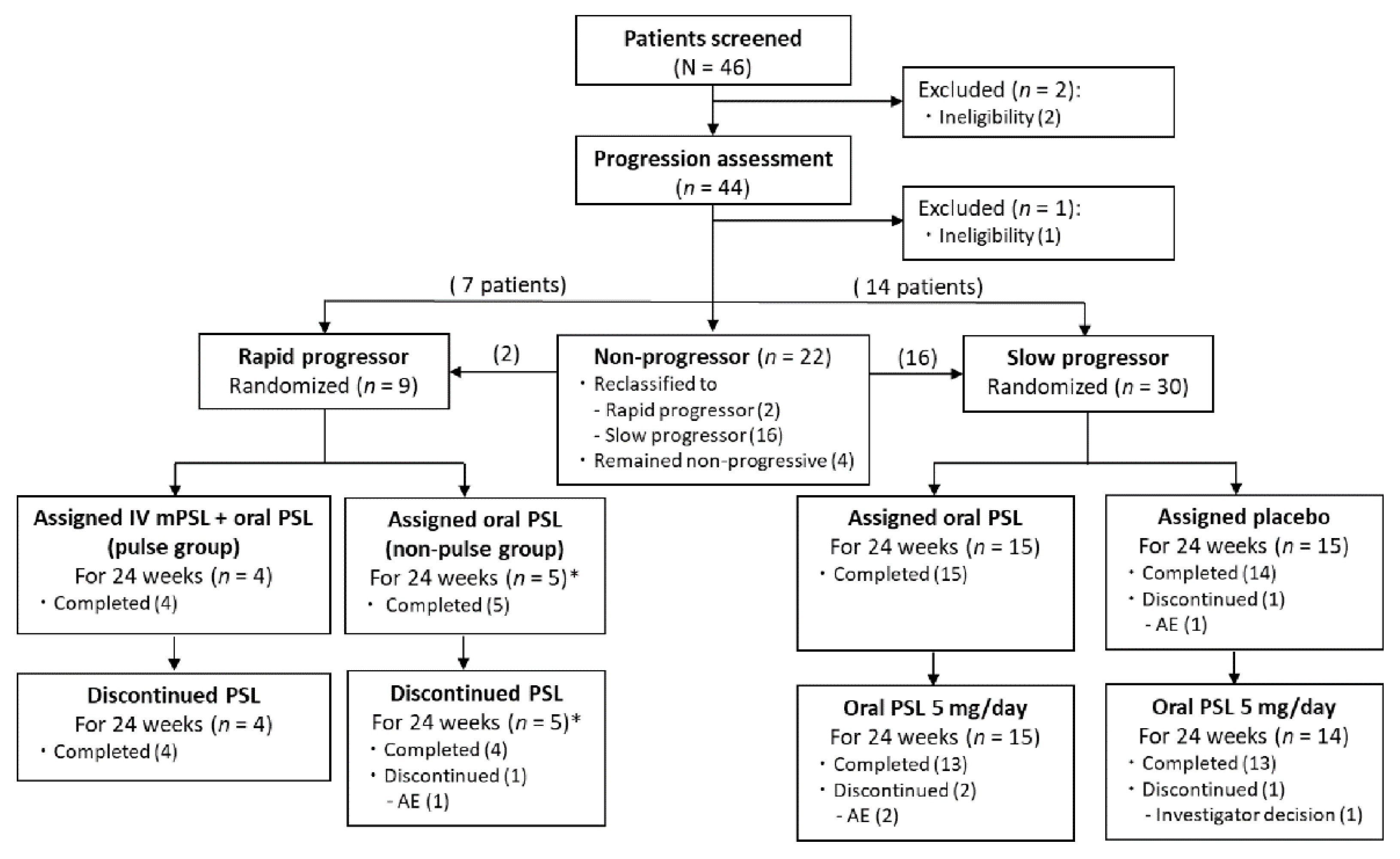
“SARS-CoV-2 Causes Lung Inflammation through Metabolic Reprogramming and RAGE”
by Charles N. S. Allen, Maryline Santerre, Sterling P. Arjona, Lea J. Ghaleb, Muna Herzi, Megan D. Llewellyn, Natalia Shcherbik and Bassel E. Sawaya
Viruses 2022, 14(5), 983; https://doi.org/10.3390/v14050983
Available online: https://www.mdpi.com/1999-4915/14/5/983
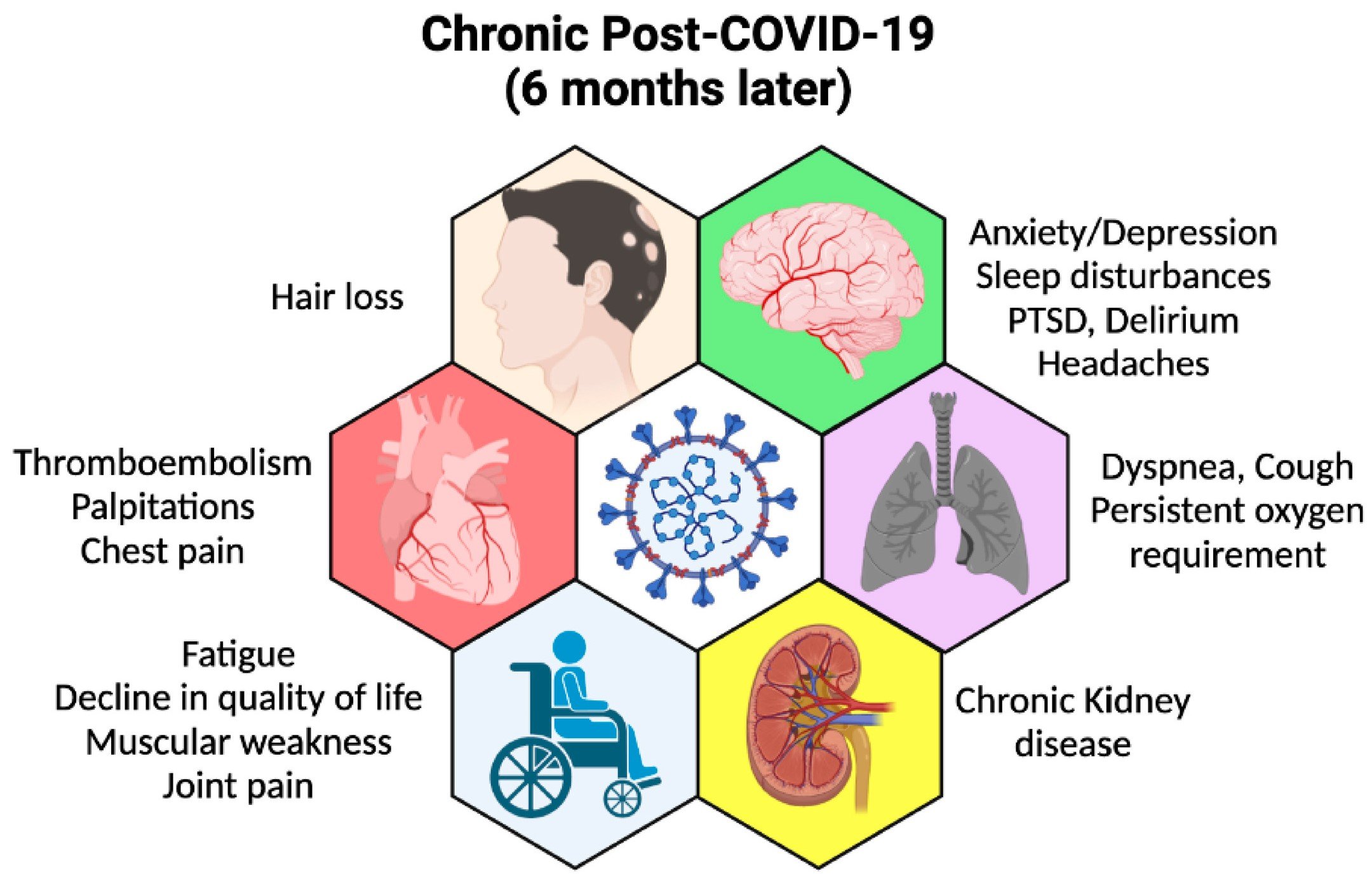
“TRIM7 Restricts Coxsackievirus and Norovirus Infection by Detecting the C-Terminal Glutamine Generated by 3C Protease Processing”
by Jakub Luptak, Donna L. Mallery, Aminu S. Jahun, Anna Albecka, Dean Clift, Osaid Ather, Greg Slodkowicz, Ian Goodfellow and Leo C. James
Viruses 2022, 14(8), 1610; https://doi.org/10.3390/v14081610
Available online: https://www.mdpi.com/1999-4915/14/8/1610
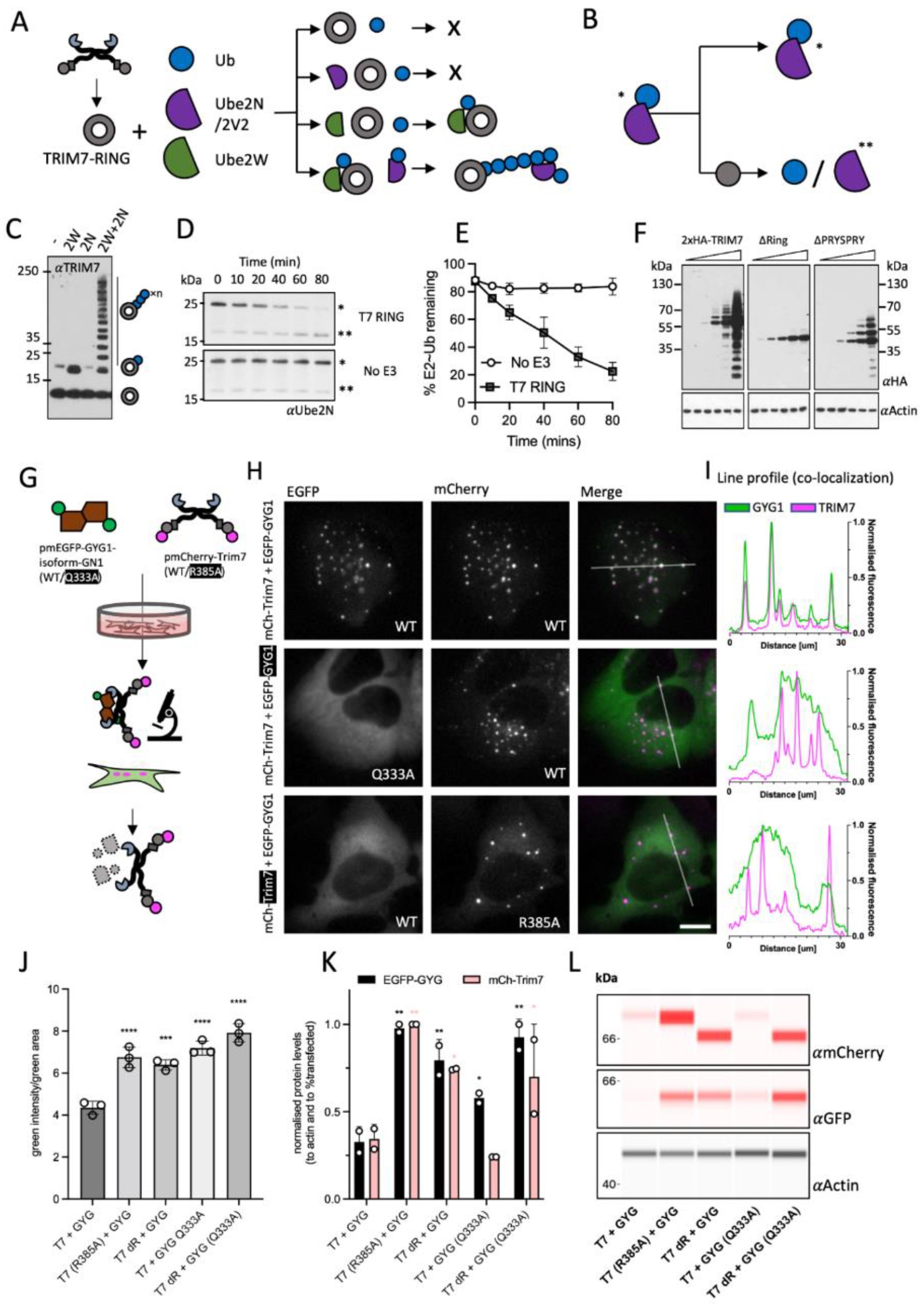
“A Secreted Form of the Hepatitis E Virus ORF2 Protein: Design Strategy, Antigenicity and Immunogenicity”
by Zihao Chen, Shaoqi Guo, Guanghui Li, Dong Ying, Guiping Wen, Mujin Fang, Yingbin Wang, Zimin Tang, Zizheng Zheng and Ningshao Xia
Viruses 2022, 14(10), 2122; https://doi.org/10.3390/v14102122
Available online: https://www.mdpi.com/1999-4915/14/10/2122
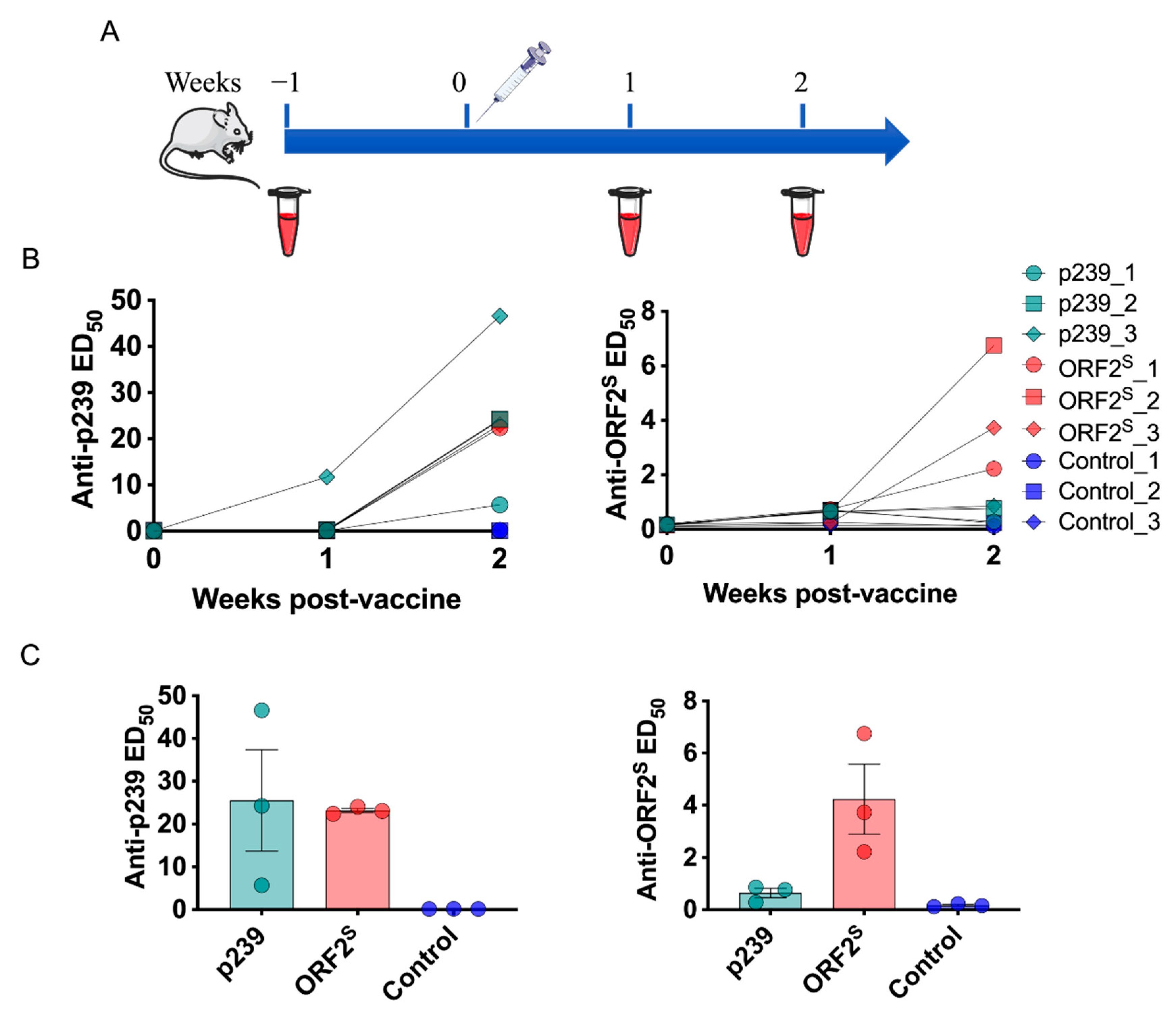
“Cytokine Profiling of Amniotic Fluid from Congenital Cytomegalovirus Infection”
by Nicolas Bourgon, Wendy Fitzgerald, Hugues Aschard, Jean-François Magny, Tiffany Guilleminot, Julien Stirnemann, Roberto Romero, Yves Ville, Leonid Margolis and Marianne Leruez-Ville
Viruses 2022, 14(10), 2145; https://doi.org/10.3390/v14102145
Available online: https://www.mdpi.com/1999-4915/14/10/2145
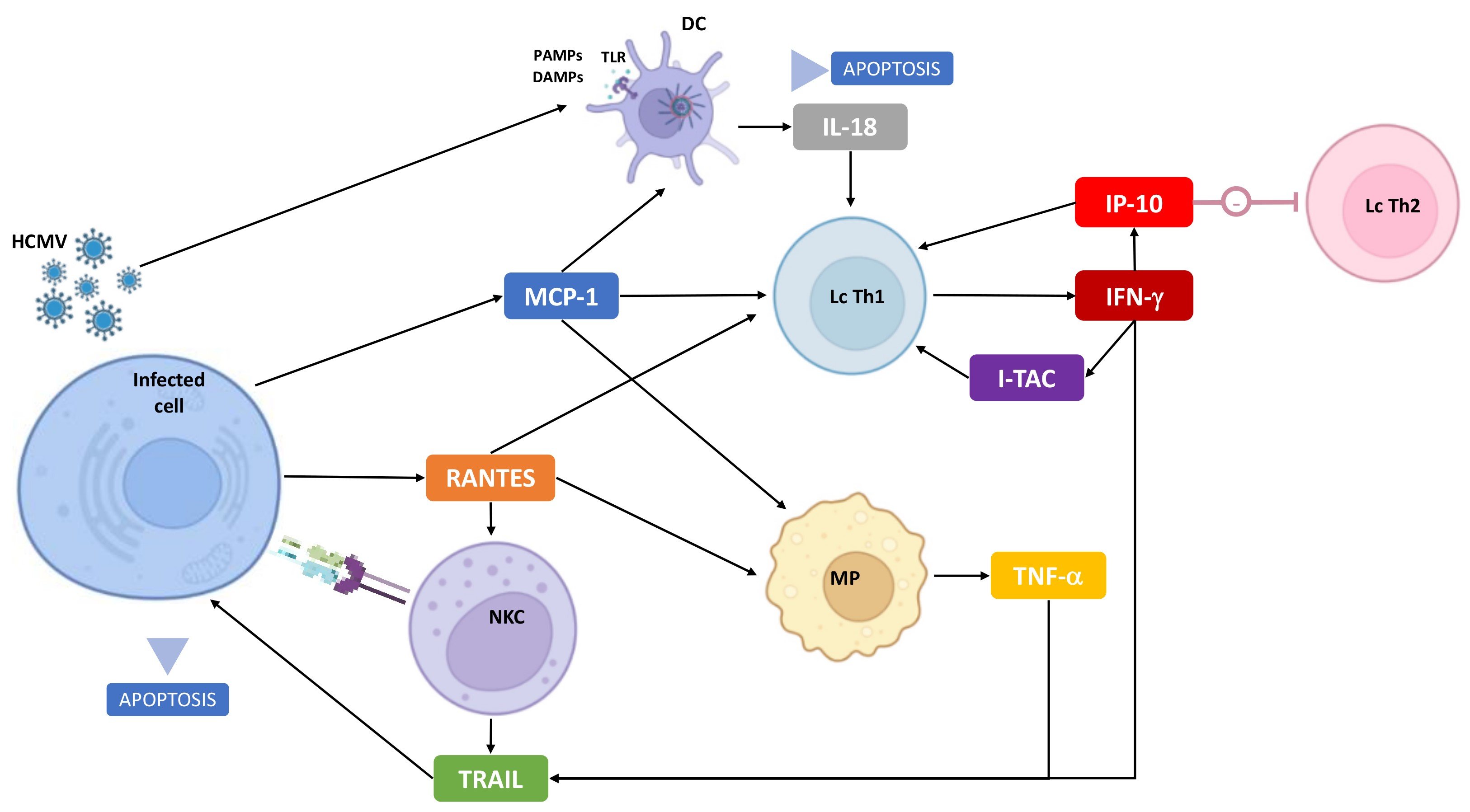
“SIV Infection Regulates Compartmentalization of Circulating Blood Plasma miRNAs within Extracellular Vesicles (EVs) and Extracellular Condensates (ECs) and Decreases EV-Associated miRNA-128”
by Steven Kopcho, Marina McDew-White, Wasifa Naushad, Mahesh Mohan and Chioma M. Okeoma
Viruses 2023, 15(3), 622; https://doi.org/10.3390/v15030622
Available online: https://www.mdpi.com/1999-4915/15/3/622
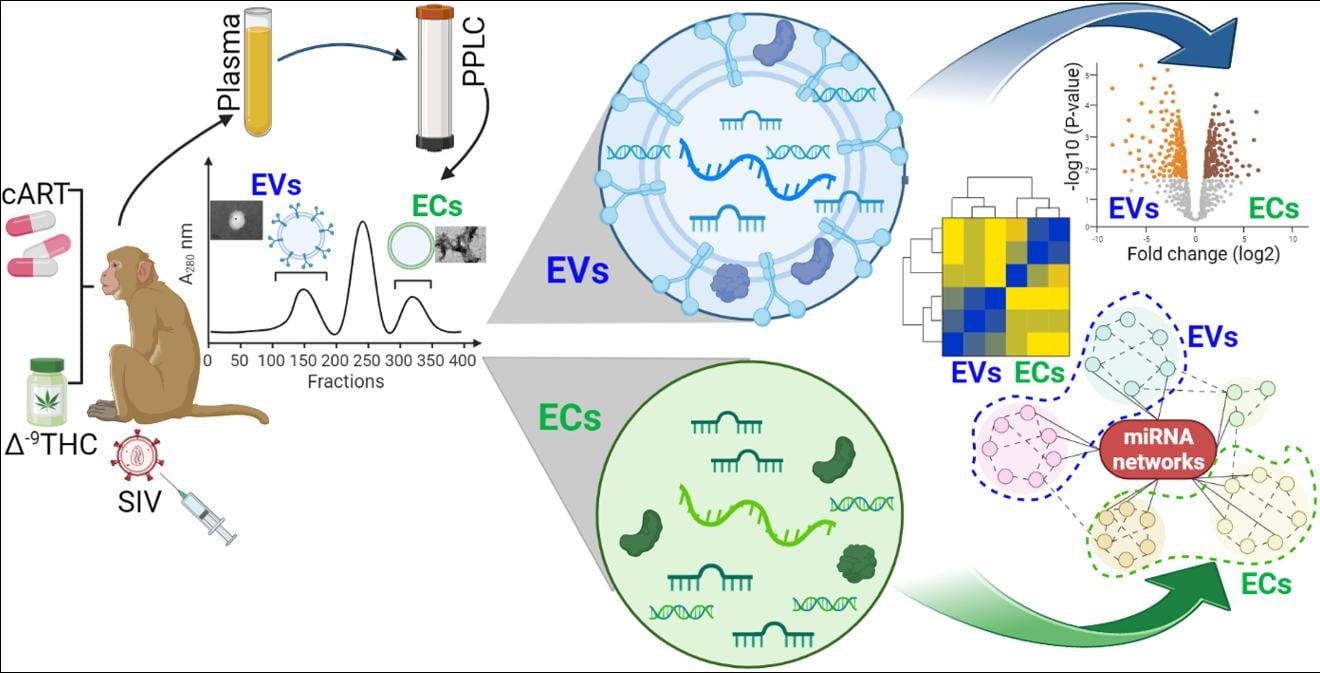
“Receptor Binding-Induced Conformational Changes in Herpes Simplex Virus Glycoprotein D Permit Interaction with the gH/gL Complex to Activate Fusion”
by Doina Atanasiu, Wan Ting Saw, Tina M. Cairns, Harvey M. Friedman, Roselyn J. Eisenberg and Gary H. Cohen
Viruses 2023, 15(4), 895; https://doi.org/10.3390/v15040895
Available online: https://www.mdpi.com/1999-4915/15/4/895
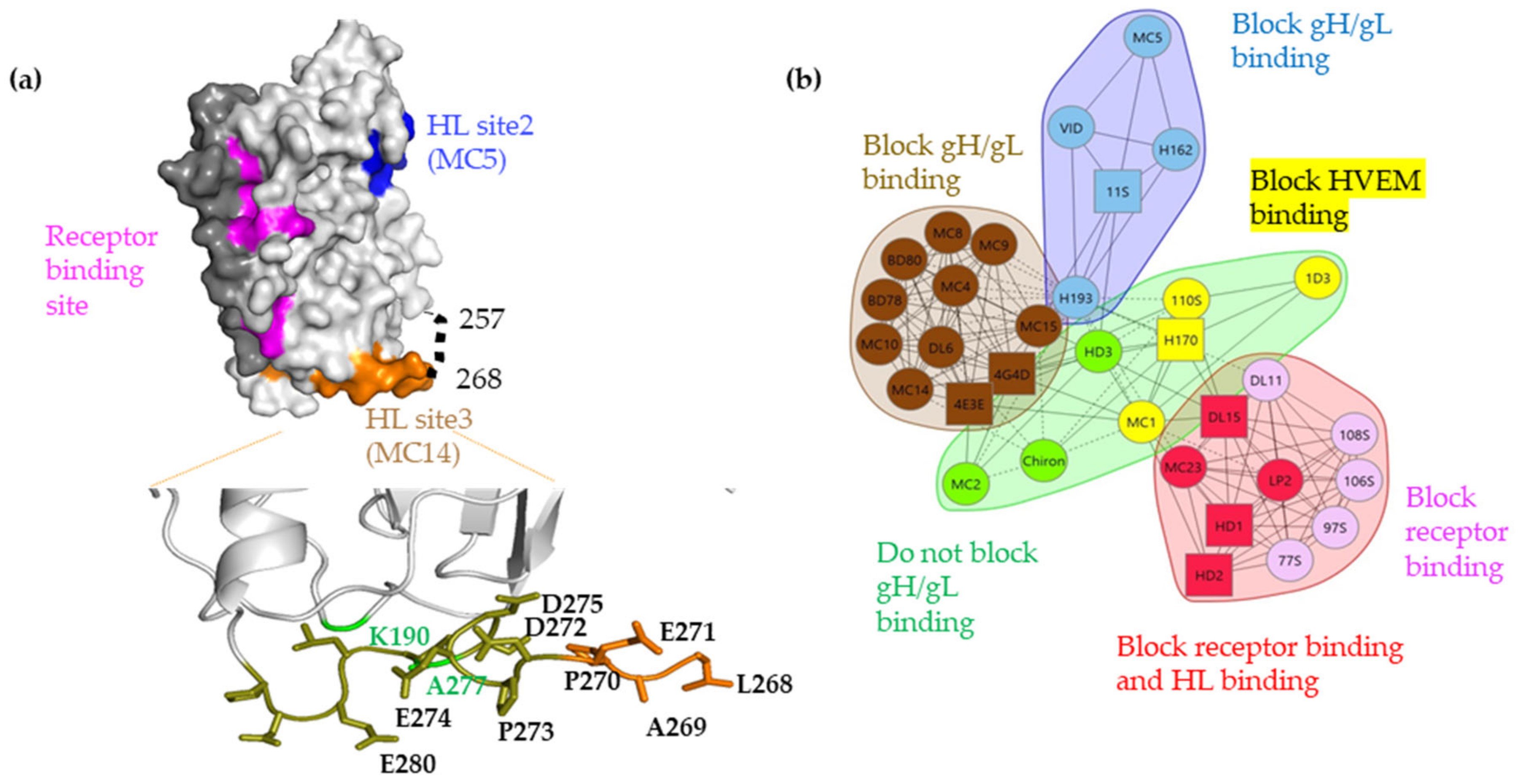
“The Circulating miRNA Profile of Chronic Hepatitis D and B Patients Is Comparable but Differs from That of Individuals with HBeAg-Negative HBV Infection”
by Daniela Cavallone, Eric David B. Ornos, Gabriele Ricco, Filippo Oliveri, Barbara Coco, Piero Colombatto, Laura De Rosa, Leslie Michelle M. Dalmacio, Ferruccio Bonino and Maurizia Rossana Brunetto
Viruses 2023, 15(11), 2257; https://doi.org/10.3390/v15112257
Available online: https://www.mdpi.com/1999-4915/15/11/2257
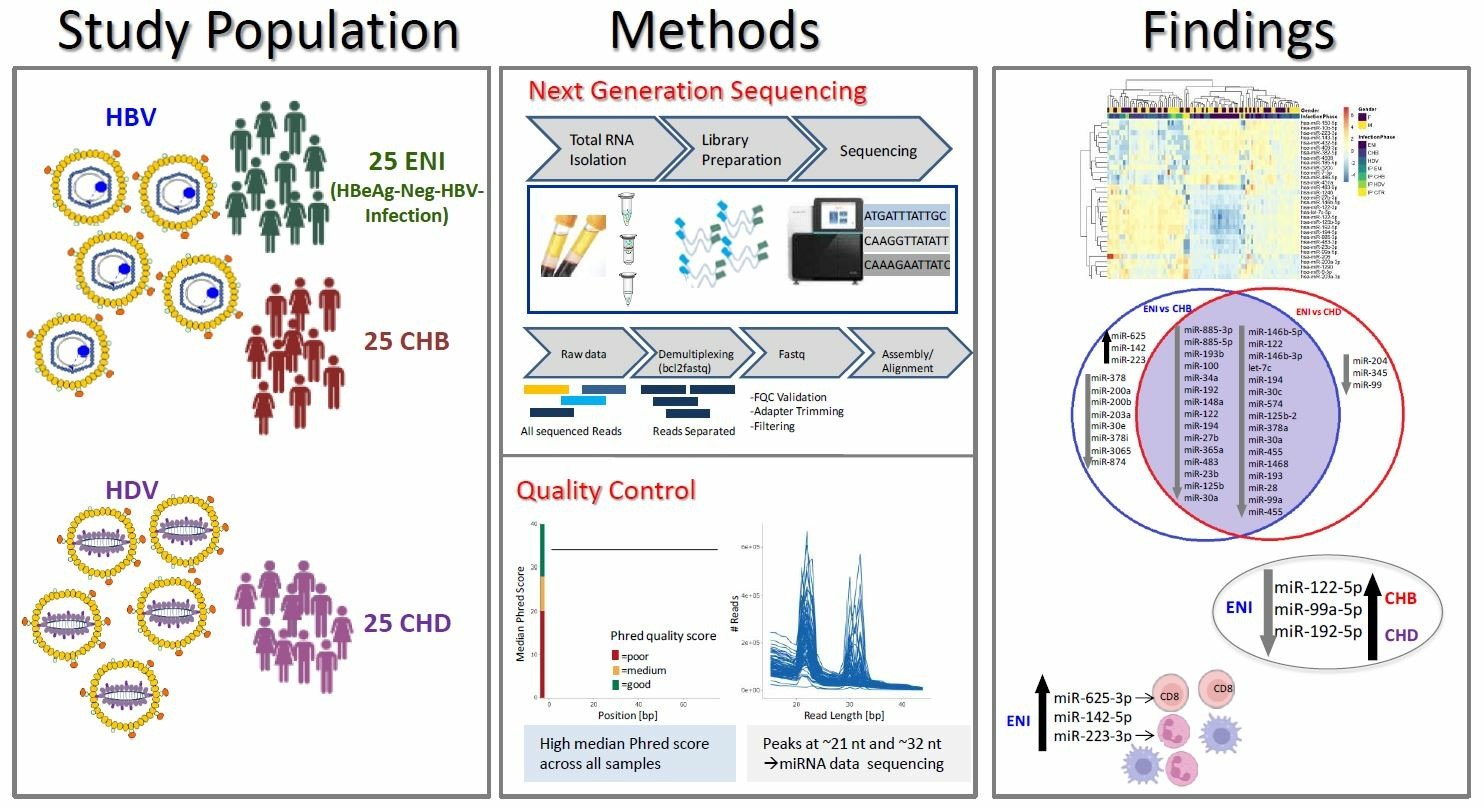
“An Inducible ESCRT-III Inhibition Tool to Control HIV-1 Budding”
by Haiyan Wang, Benoit Gallet, Christine Moriscot, Mylène Pezet, Christine Chatellard, Jean-Philippe Kleman, Heinrich Göttlinger, Winfried Weissenhorn and Cécile Boscheron
Viruses 2023, 15(12), 2289; https://doi.org/10.3390/v15122289
Available online: https://www.mdpi.com/1999-4915/15/12/2289
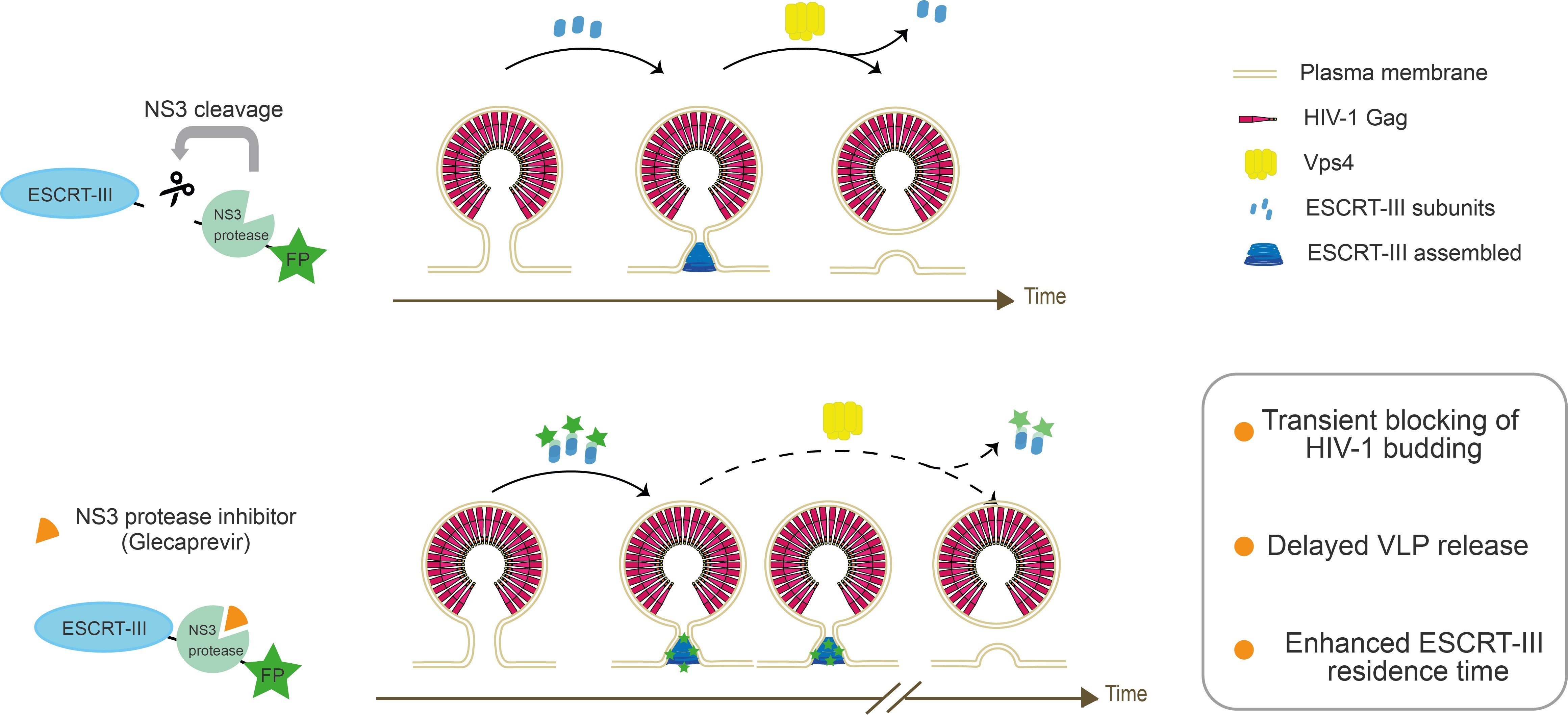
“Evolving Horizons: Adenovirus Vectors’ Timeless Influence on Cancer, Gene Therapy and Vaccines”
by Prasad D. Trivedi, Barry J. Byrne and Manuela Corti
Viruses 2023, 15(12), 2378; https://doi.org/10.3390/v15122378
Available online: https://www.mdpi.com/1999-4915/15/12/2378
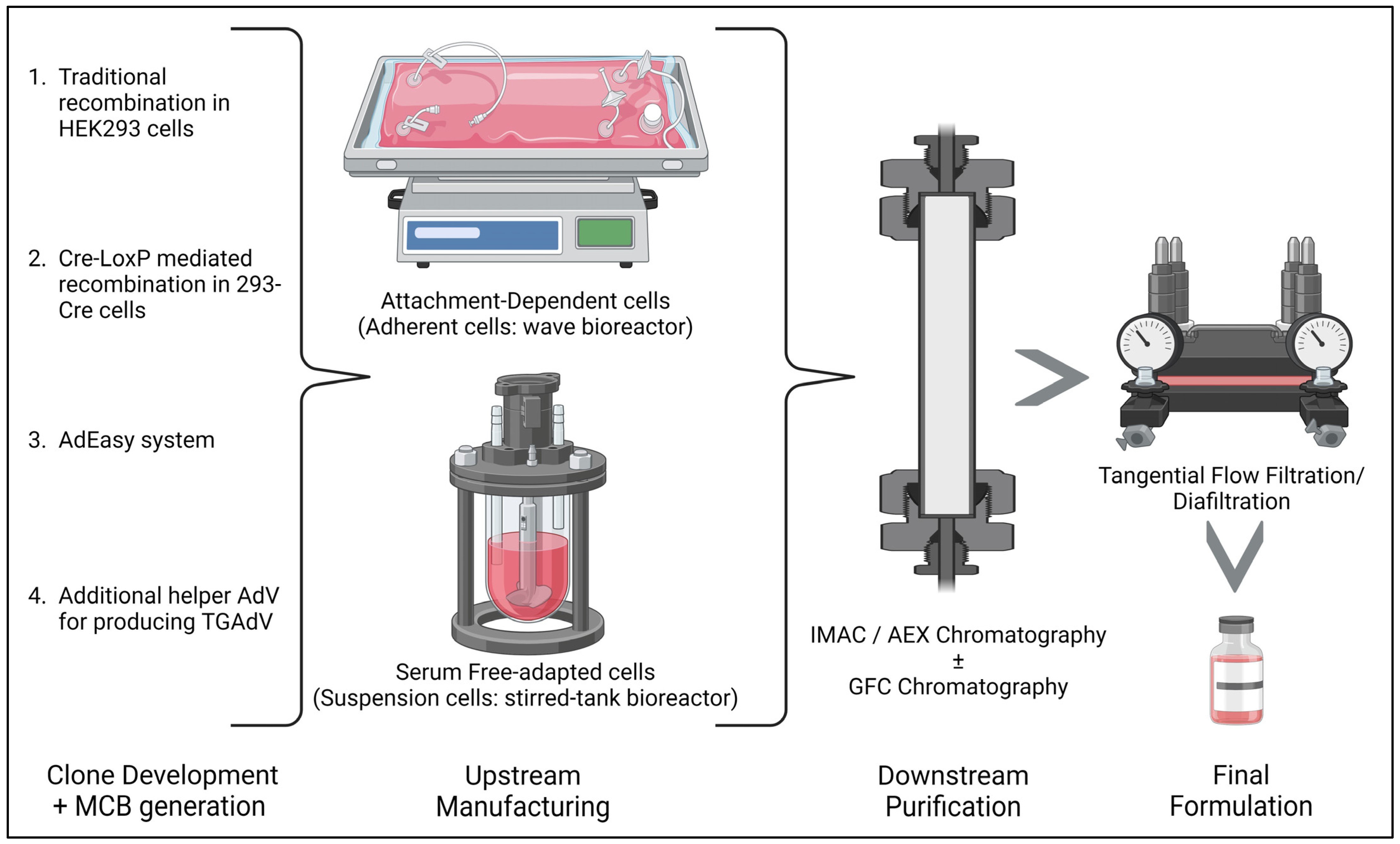
10 October 2024
Viruses | Editor’s Choice Articles from 2022 to 2023 in Section “Viruses of Plants, Fungi and Protozoa”
“Functional Characterization of Replication-Associated Proteins Encoded by Alphasatellites Identified in Yunnan Province, China”
by Liling Zhao, Xuan Che, Zhanqi Wang, Xueping Zhou and Yan Xie
Viruses 2022, 14(2), 222: https://doi.org/10.3390/v14020222
Available online: https://www.mdpi.com/1999-4915/14/2/222
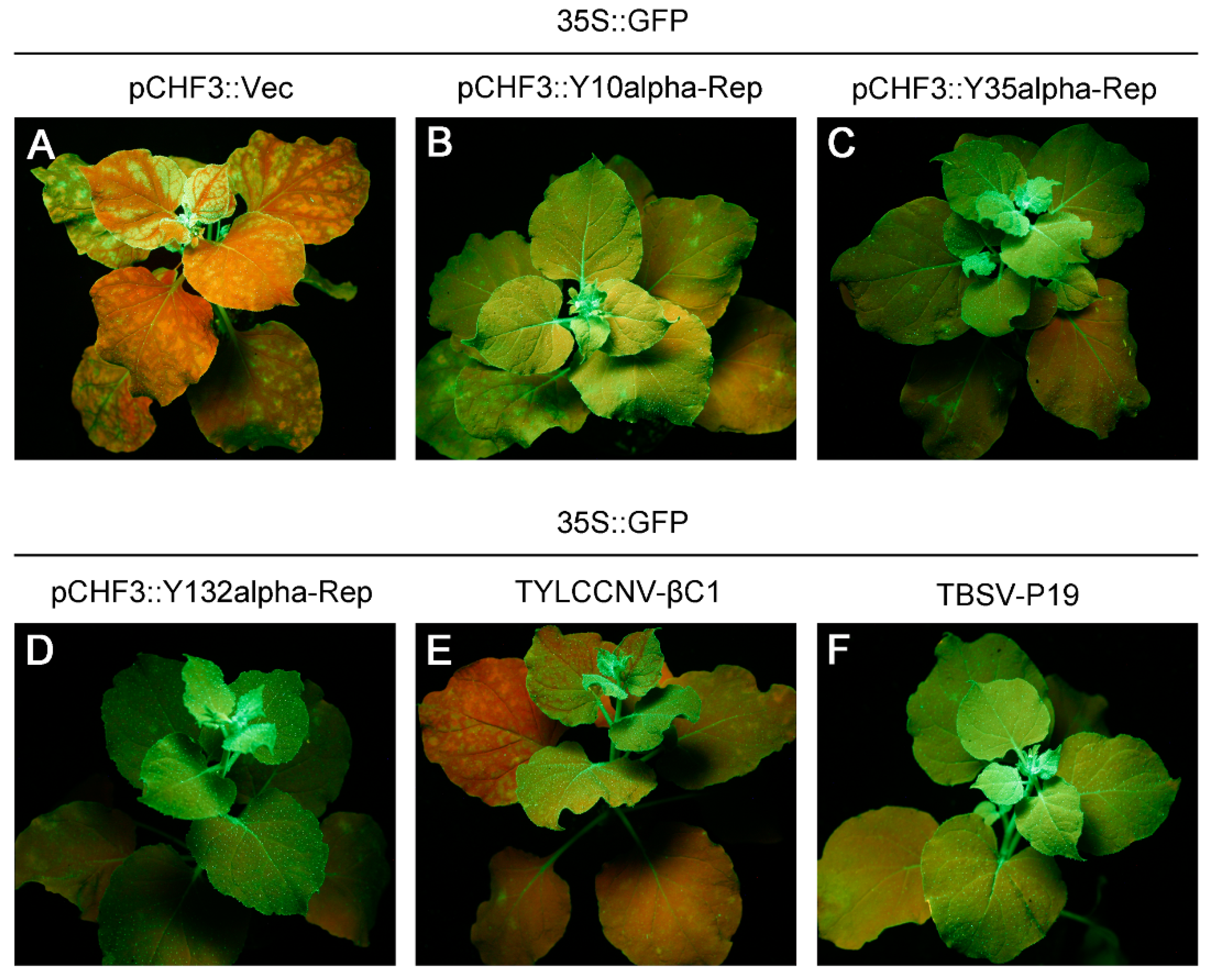
“A Capsid Protein Fragment of a Fusagra-like Virus Found in Carica papaya Latex Interacts with the 50S Ribosomal Protein L17”
by Marlonni Maurastoni, Tathiana F. Sá Antunes, Emanuel F. M. Abreu, Simone G. Ribeiro, Angela Mehta, Marcio M. Sanches, Wagner Fontes, Elliot W. Kitajima, Fabiano T. Cruz, Alexandre M. C. Santos et al.
Viruses 2023, 15(2), 541: https://doi.org/10.3390/v15020541
Available online: https://www.mdpi.com/1999-4915/15/2/541
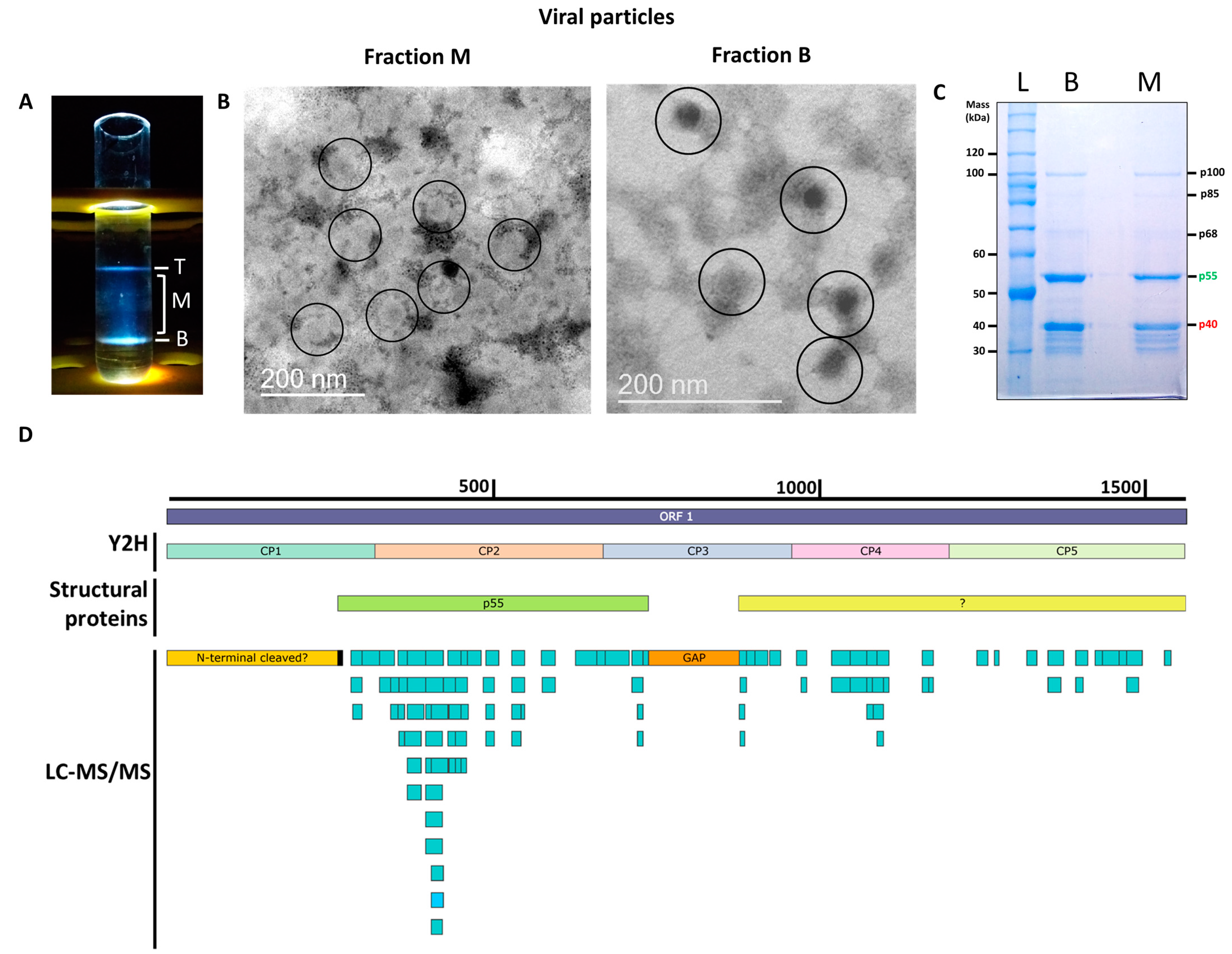
“Efficient Purification of Cowpea Chlorotic Mottle Virus by a Novel Peptide Aptamer”
by Georg Tscheuschner, Marco Ponader, Christopher Raab, Prisca S. Weider, Reni Hartfiel, Jan Ole Kaufmann, Jule L. Völzke, Gaby Bosc-Bierne, Carsten Prinz, Timm Schwaar et al.
Viruses 2023, 15(3), 697: https://doi.org/10.3390/v15030697
Available online: https://www.mdpi.com/1999-4915/15/3/697
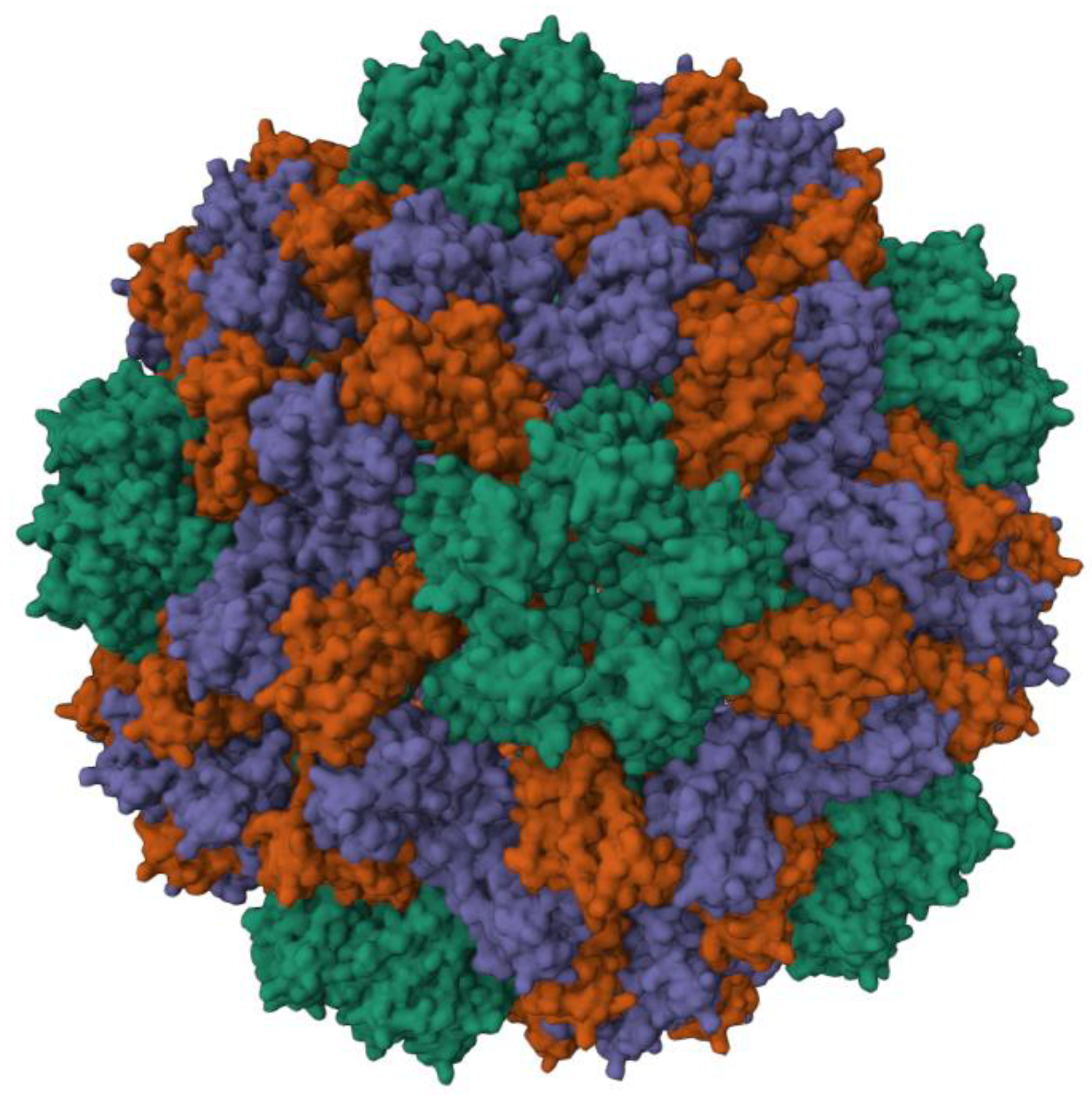
“Identifying Putative Resistance Genes for Barley Yellow Dwarf Virus-PAV in Wheat and Barley”
by Glenda Alquicer, Emad Ibrahim, Midatharahally N. Maruthi and Jiban Kumar Kundu
Viruses 2023, 15(3), 716: https://doi.org/10.3390/v15030716
Available online: https://www.mdpi.com/1999-4915/15/3/716
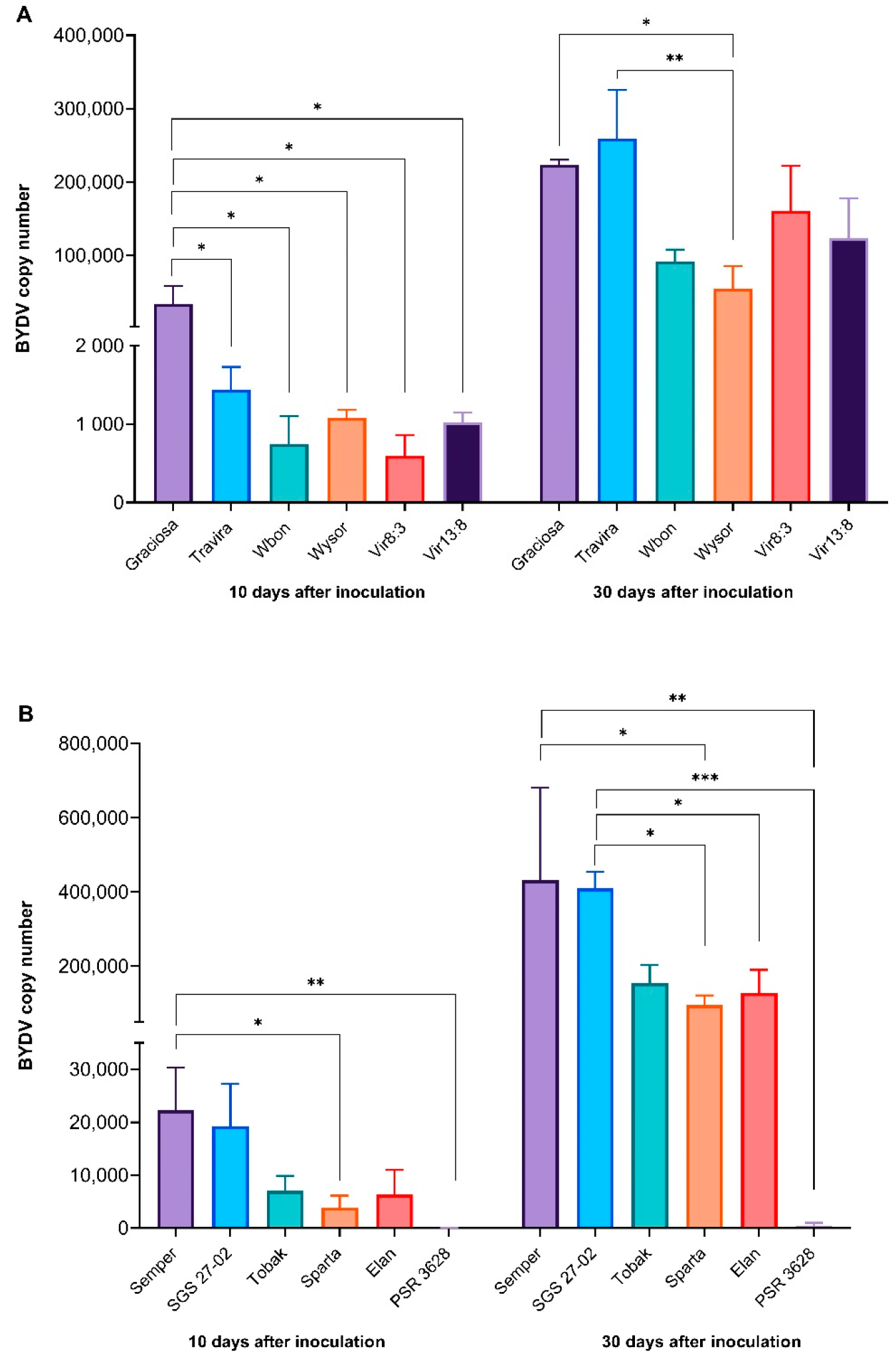
“Interactions of Tomato Chlorosis Virus p27 Protein with Tomato Catalase Are Involved in Viral Infection”
by Xiaohui Sun, Lianyi Zang, Xiaoying Liu, Shanshan Jiang, Xianping Zhang, Dan Zhao, Kaijie Shang, Tao Zhou, Changxiang Zhu and Xiaoping Zhu
Viruses 2023, 15(4), 990: https://doi.org/10.3390/v15040990
Available online: https://www.mdpi.com/1999-4915/15/4/990
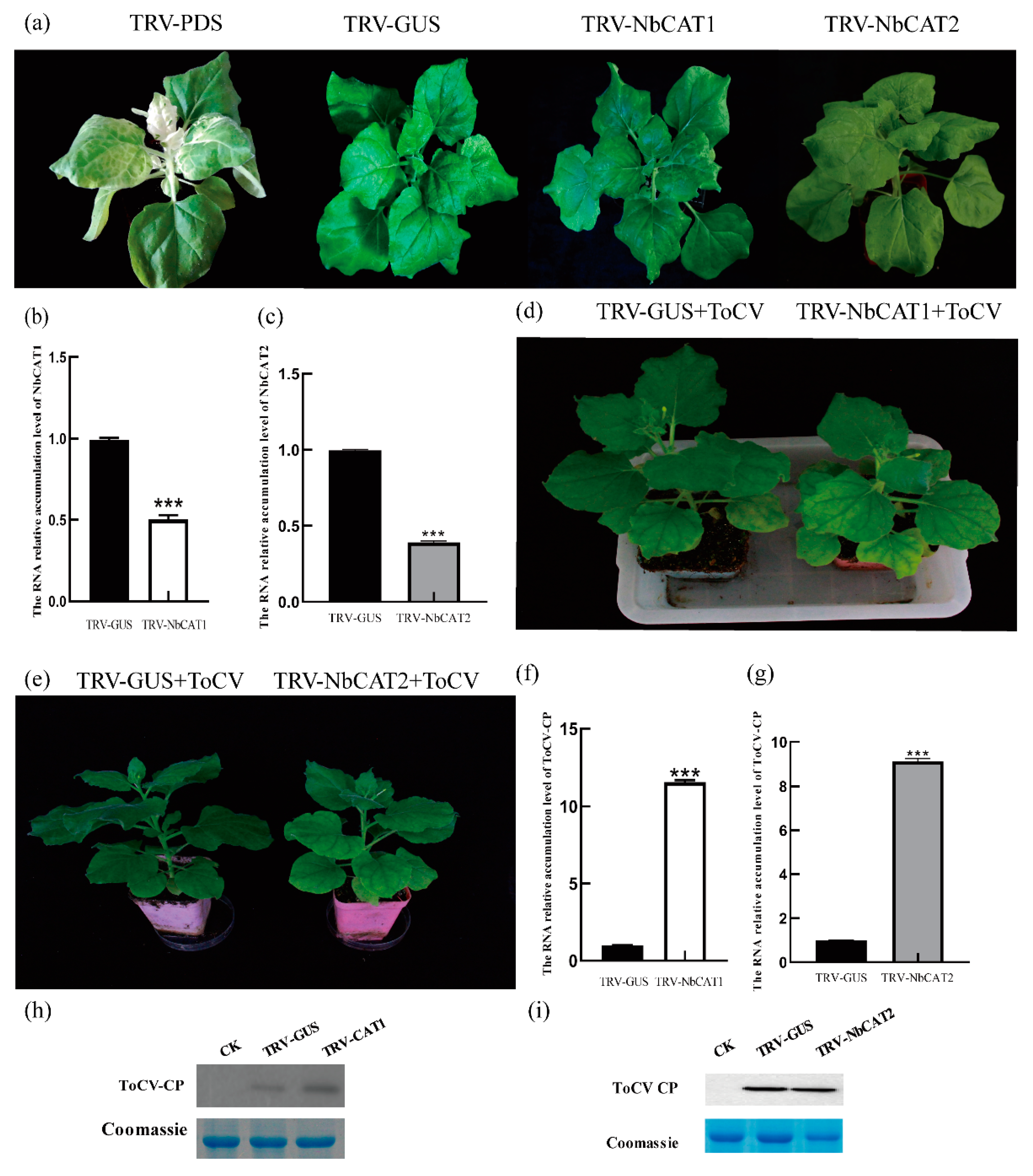
“Proteomics Identified UDP-Glycosyltransferase Family Members as Pro-Viral Factors for Turnip Mosaic Virus Infection in Nicotiana benthamiana”
by Kaida Ding, Zhaoxing Jia, Penghuan Rui, Xinxin Fang, Hongying Zheng, Jianping Chen, Fei Yan and Guanwei Wu
Viruses 2023, 15(6), 1401: https://doi.org/10.3390/v15061401
Available online: https://www.mdpi.com/1999-4915/15/6/1401
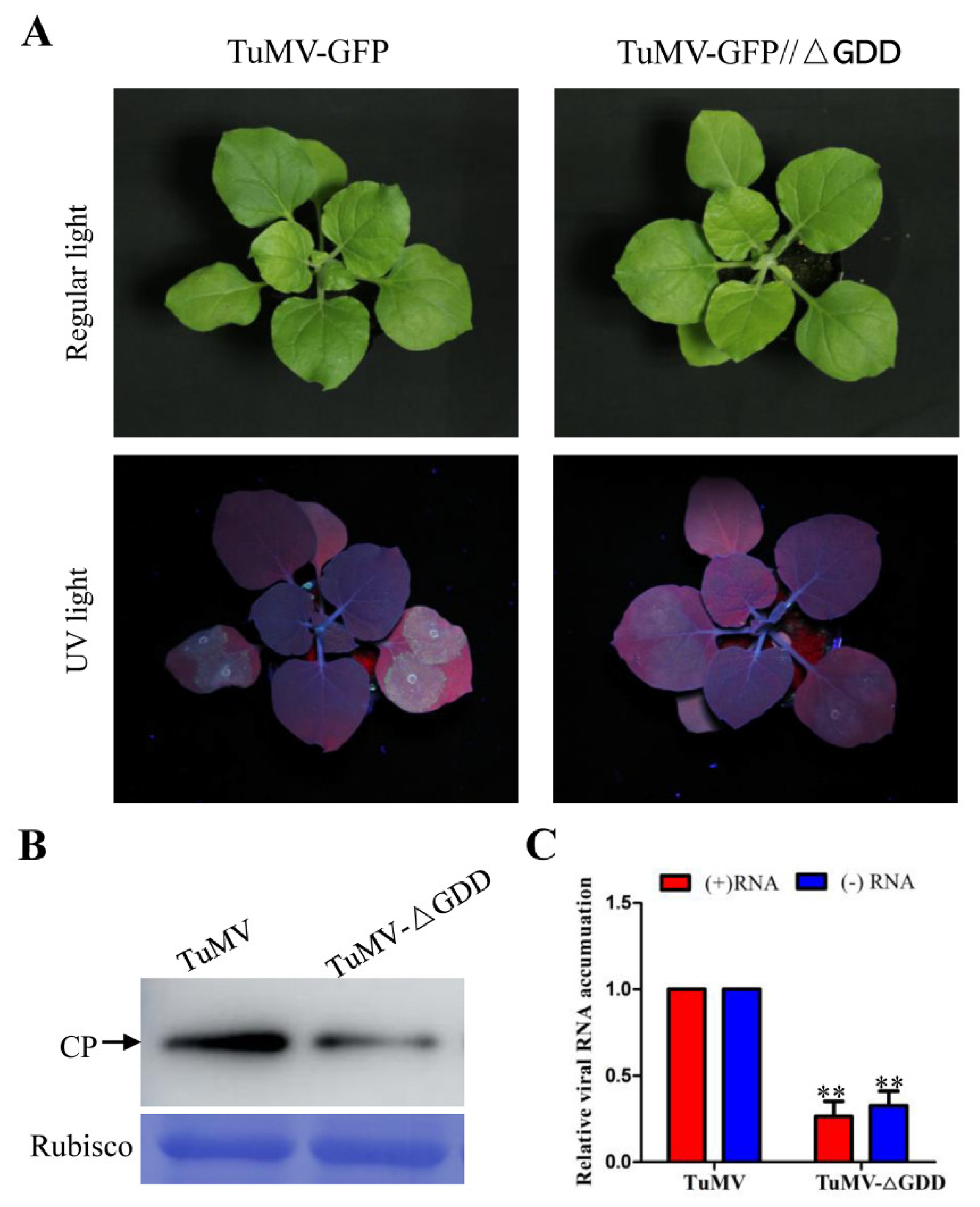
“P3 and NIa-Pro of Turnip Mosaic Virus Are Independent Elicitors of Superinfection Exclusion”
by Haritha Nunna, Feng Qu and Satyanarayana Tatineni
Viruses 2023, 15(7), 1459: https://doi.org/10.3390/v15071459
Available online: https://www.mdpi.com/1999-4915/15/7/1459
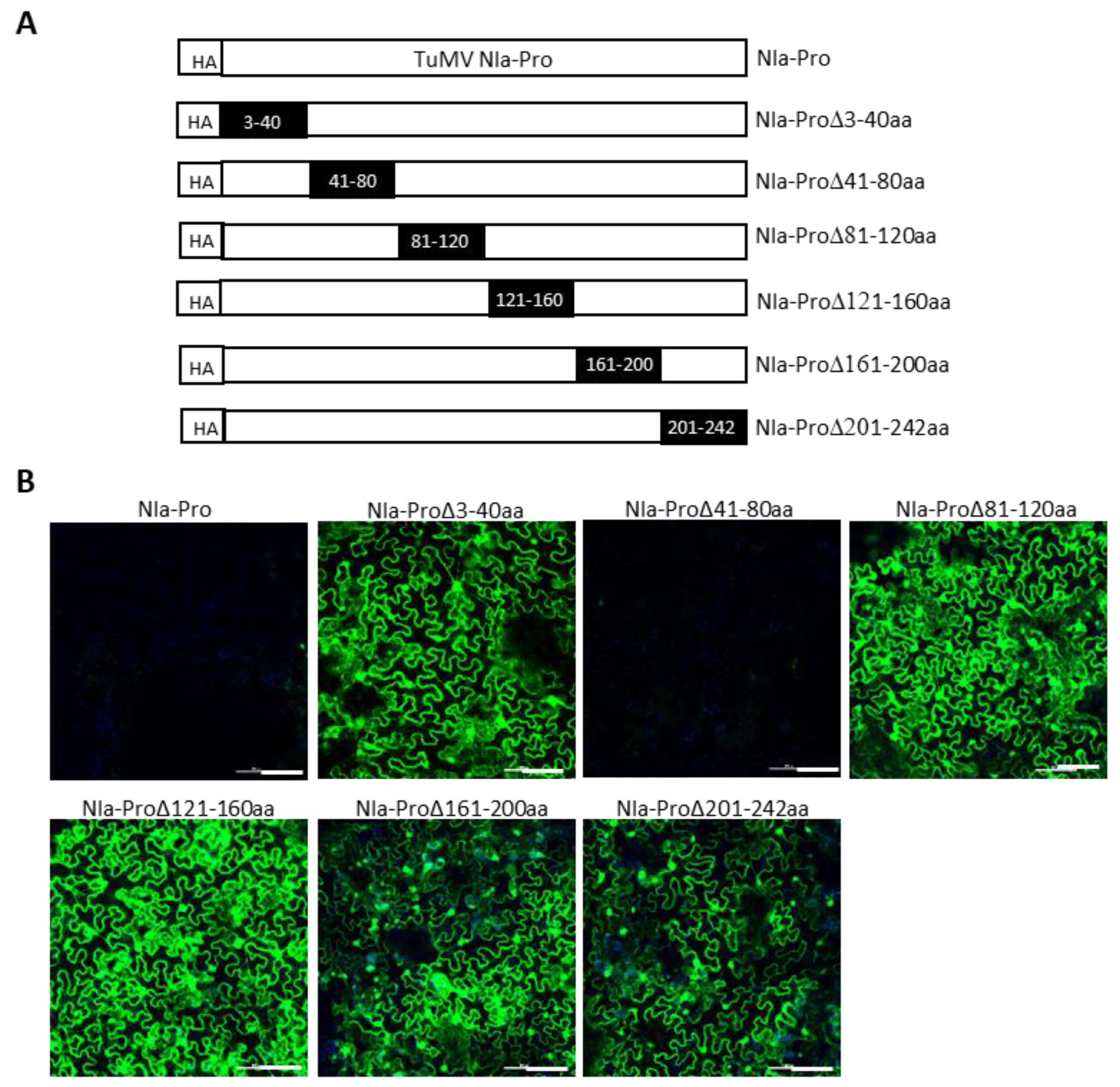
“Small Heat Shock Protein (sHsp22.98) from Trialeurodes vaporariorum Plays Important Role in Apple Scar Skin Viroid Transmission”
by Savita Chaudhary, Vijayanandraj Selvaraj, Preshika Awasthi, Swati Bhuria, Rituraj Purohit, Surender Kumar and Vipin Hallan
Viruses 2023, 15(10), 2069: https://doi.org/10.3390/v15102069
Available online: https://www.mdpi.com/1999-4915/15/10/2069
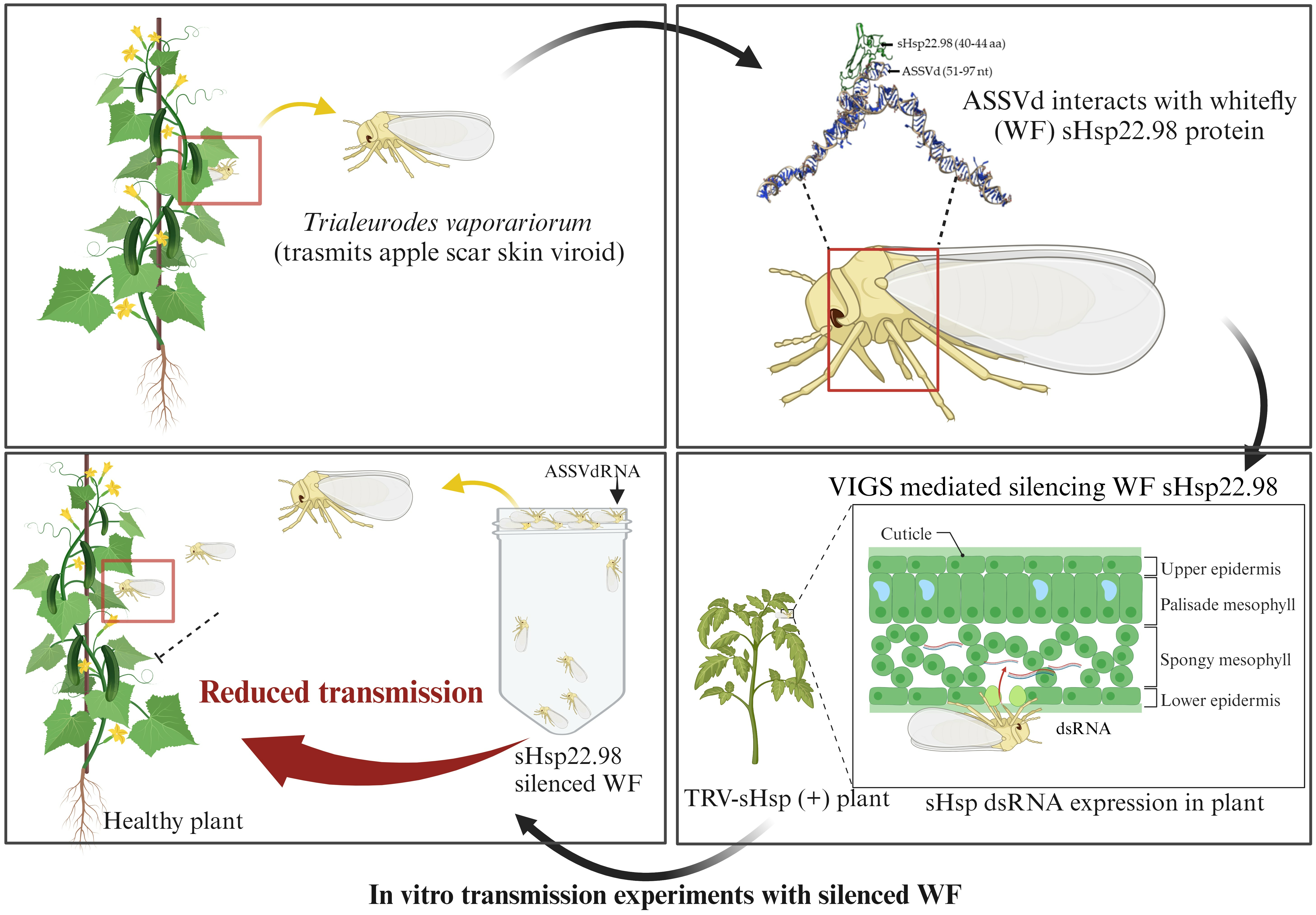
“Enhanced Susceptibility to Tomato Chlorosis Virus (ToCV) in Hsp90- and Sgt1-Silenced Plants: Insights from Gene Expression Dynamics”
by Irene Ontiveros, Noé Fernández-Pozo, Anna Esteve-Codina, Juan José López-Moya and Juan Antonio Díaz-Pendón
Viruses 2023, 15, 2370: https://doi.org/10.3390/v15122370
Available online: https://www.mdpi.com/1999-4915/15/12/2370
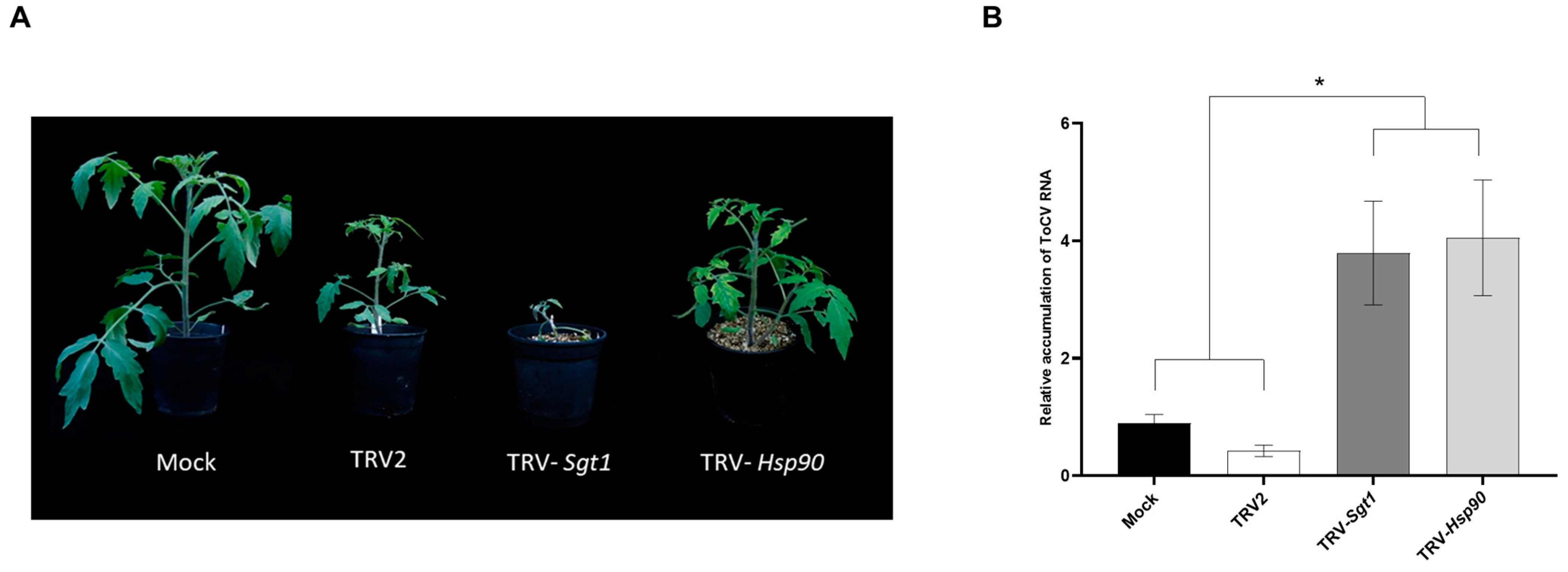
10 October 2024
Viruses | Editor’s Choice Articles from 2022 to 2023 Related to General Virology
“Human Cytomegalovirus Infection Elicits Global Changes in Host Transcription by RNA Polymerases I, II, and III”
by Christopher B. Ball, Mrutyunjaya Parida, Ming Li, Benjamin M. Spector, Gustavo A. Suarez, Jeffery L. Meier and David H. Price
Viruses 2022, 14(4), 779; https://doi.org/10.3390/v14040779
Available online: https://www.mdpi.com/1999-4915/14/4/779

“Phosphomimetic S207D Lysyl–tRNA Synthetase Binds HIV-1 5′UTR in an Open Conformation and Increases RNA Dynamics”
by William A. Cantara, Chathuri Pathirage, Joshua Hatterschide, Erik D. Olson and Karin Musier-Forsyth
Viruses 2022, 14(7), 1556; https://doi.org/10.3390/v14071556
Available online: https://www.mdpi.com/1999-4915/14/7/1556

“Female Genital Fibroblasts Diminish the In Vitro Efficacy of PrEP against HIV”
by Ashley F. George, Matthew McGregor, David Gingrich, Jason Neidleman, Rebecca S. Marquez, Kyrlia C. Young, Kaavya L. Thanigaivelan, Warner C. Greene, Phyllis C. Tien, Amelia N. Deitchman et al.
Viruses 2022, 14(8), 1723; https://doi.org/10.3390/v14081723
Available online: https://www.mdpi.com/1999-4915/14/8/1723

“Structural Dynamics and Activity of B19V VP1u during the pHs of Cell Entry and Endosomal Trafficking”
by Renuk V. Lakshmanan, Joshua A. Hull, Luke Berry, Matthew Burg, Brian Bothner, Robert McKenna and Mavis Agbandje-McKenna
Viruses 2022, 14(9), 1922; https://doi.org/10.3390/v14091922
Available online: https://www.mdpi.com/1999-4915/14/9/1922

“Biophysical Modeling of SARS-CoV-2 Assembly: Genome Condensation and Budding”
by Siyu Li and Roya Zandi
Viruses 2022, 14(10), 2089; https://doi.org/10.3390/v14102089
Available online: https://www.mdpi.com/1999-4915/14/10/2089

“Development and Characterization of Efficient Cell Culture Systems for Genotype 1 Hepatitis E Virus and Its Infectious cDNA Clone”
by Putu Prathiwi Primadharsini, Shigeo Nagashima, Toshinori Tanaka, Suljid Jirintai, Masaharu Takahashi, Kazumoto Murata and Hiroaki Okamoto
Viruses 2023, 15(4), 845; https://doi.org/10.3390/v15040845
Available online: https://www.mdpi.com/1999-4915/15/4/845

“Noncoding RNA of Zika Virus Affects Interplay between Wnt-Signaling and Pro-Apoptotic Pathways in Developing Brain Tissue”
by Andrii Slonchak, Harman Chaggar, Julio Aguado, Ernst Wolvetang and Alexander A. Khromykh
Viruses 2023, 15(5), 1062; https://doi.org/10.3390/v15051062
Available online: https://www.mdpi.com/1999-4915/15/5/1062

“Polyomavirus Wakes Up and Chooses Neurovirulence”
by Arrienne B. Butic, Samantha A. Spencer, Shareef K. Shaheen and Aron E. Lukacher
Viruses 2023, 15(10), 2112; https://doi.org/10.3390/v15102112
Available online: https://www.mdpi.com/1999-4915/15/10/2112

4 October 2024
MDPI INSIGHTS: The CEO's Letter #16 - UNGA79 Science Summit, OASPA, Peer Review Week

Welcome to the MDPI Insights: The CEO's Letter.
In these monthly letters, I will showcase two key aspects of our work at MDPI: our commitment to empowering researchers and our determination to facilitating open scientific exchange.
Opening Thoughts

MDPI Joins the Science Summit at UNGA79 (23–27 September 2024, New York)
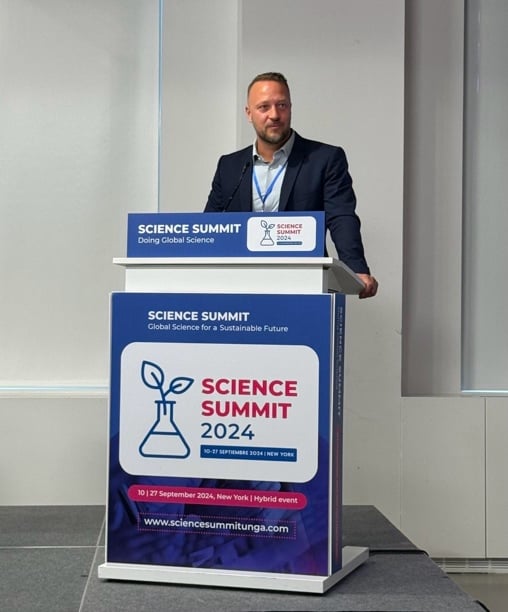
On Friday 27 September, I had the privilege of giving the opening talk at the “Youth at the Science Summit” panel during the Science Summit conference, held in New York at the 79th session of the United Nations General Assembly (UNGA). Together, we discussed the future of science, publishing, innovation, and sustainable development.
It was a great opportunity to learn from our young leaders, whose voices must be included in the conversation as science shapes the future of artificial intelligence, climate mitigation, healthcare, technology, and more. This was also a powerful reminder of how essential global collaboration is in solving the major challenges we face. I left inspired by the dedication of these young researchers to making the world a better place!
Today’s youth are not just the leaders of tomorrow – they are already leading the change today.
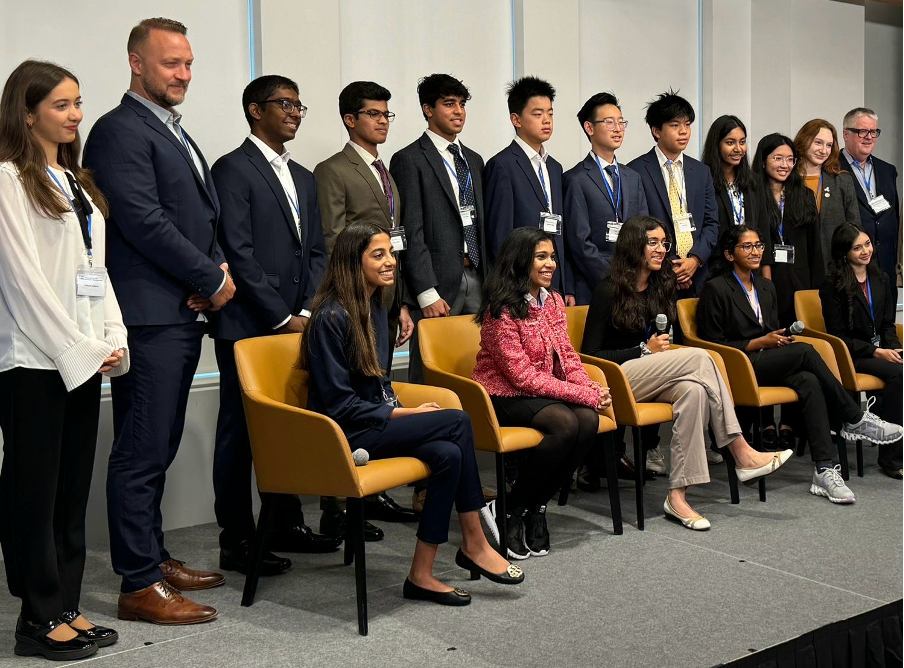
Stefan Tochev (second from left) at the UNGA Science Summit 2024: “A great opportunity to learn from our young leaders.”
MDPI Supports the Future Generation of Scientists
This aligns with MDPI’s mission to support the next generation of scientists and early-career researchers by recognizing their achievements through our various MDPI awards, including the Young Investigator Awards, Best PhD Thesis Awards, Travel Awards, and more.
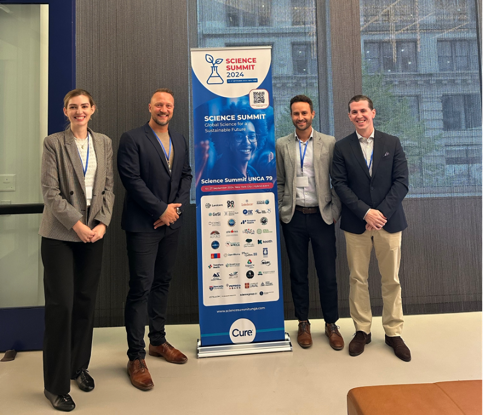
Our presence at this global event showed our commitment to advancing Open Science as a key driver for sustainable development. As a leading Open Access (OA) publisher, MDPI’s role at the summit was to emphasize the critical importance of democratizing scientific knowledge, making it accessible to all, and promoting global collaboration.
Through OA publishing, we aim to address pressing global challenges such as climate change, public health, and inequality, in line with the United Nations Sustainable Development Goals (SDGs).
“We aim to address pressing global challenges”
MDPI and the SDGs
In 2020, the SDG Publishers Compact was launched to accelerate implementation of the SDGs by promoting content that informs, develops, and inspires action. MDPI joined this initiative in 2021 and subsequently launched the MDPI SDG Hub in 2022, offering free access to recent research within the scope of each of the 17 SDGs.
During the summit, we highlighted the connection between Open Science and the SDG Publishers Compact, supporting the core objective to “Leave No One Behind” (LNOB). The transformative promise of the SDGs relies heavily on the Open Access model, which serves as a fundamental enabler of Open Science. We advocate for the wider adoption of Open Science practices in order to achieve the SDGs by 2030.
Impactful Research
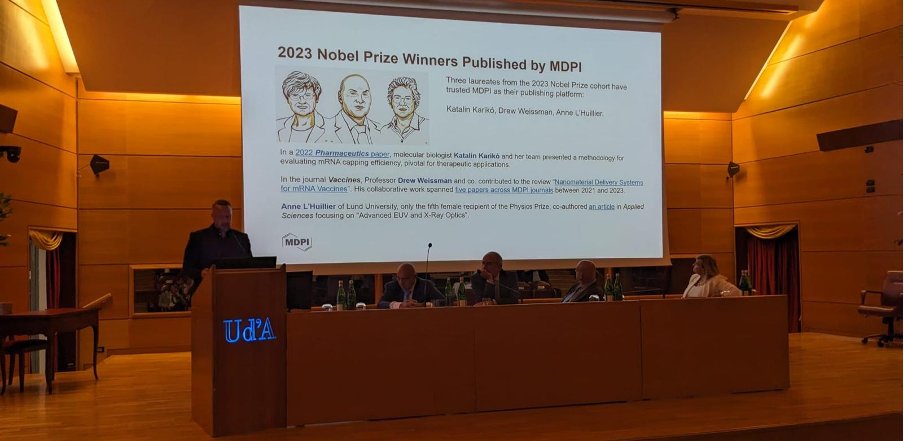
Presenting at the 1st International Conference of Environmental Medicine
In September, MDPI and our journals IJERPH and Diseases sponsored and participated in the 1st International Conference of Environmental Medicine: Environmental Threats to Human Health: From Genetics to Epigenetics, held in Chieti, Italy.
The conference was organized in collaboration with various societies, including the Italian Society of Environmental Medicine (SIMA), one of more than 160 societies partnering MDPI journals.
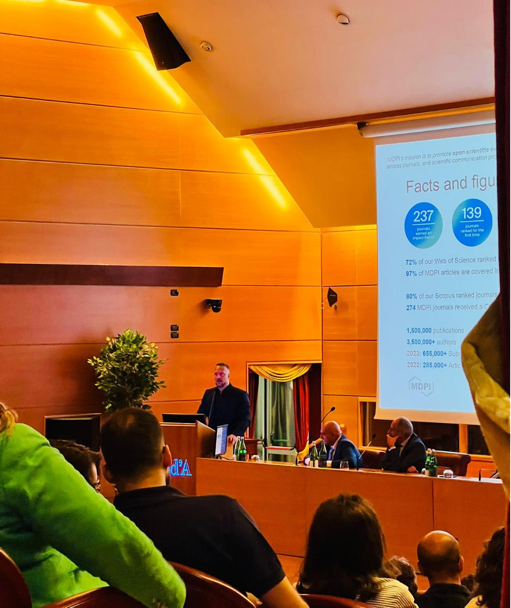
The conference brought together influential figures from the Italian scholarly community, such as Antonio Felice Uricchio (President of the National Agency for University Research Assessment [ANVUR]), Alessandro Miani (President of SIMA), and Liborio Stuppia (Director of ‘Gabriele d’Annunzio’ University of Chieti-Pescara), among others.
MDPI was the sole publishing sponsor of the conference, at which I had the opportunity to present on behalf of the company. I provided an overview of MDPI, covering key facts and figures, the peer-review process, our strong collaboration with the Italian market, and insights into Nobel Prize winners who have published with MDPI, ahead of Sir Richard Roberts’ Nobel lecture.
“As at September 2024, 44 Nobel laureates have contributed to over 115 articles across 35 MDPI journals”

The keynote speaker at the event was Sir Richard Roberts, Nobel Laureate and 1993 Nobel Prize winner in Medicine, recognized for his discovery of split genes.
Nobel Laureates’ Contributions to MDPI
As at September 2024, 44 Nobel laureates have contributed to over 115 articles across 35 MDPI journals. I’ll share more details on this in the October newsletter.
Hosting such prominent figures in their respective fields, who play a significant role in advancing the OA movement, of which we are leaders in, resonates deeply with our editorial teams.
Sponsoring and supporting academic conferences is something we do on a large scale, and it continues to grow. Attending and speaking about MDPI shows our commitment by taking the time to connect with the scholarly community in person.
MDPI’s Presence in Italy
Italy ranks third globally in total MDPI publications, with nearly 130,000 contributions. We collaborate with about 12,000 Editorial Board Members in Italy, over 6,100 of whom have an H-index of more than 25.
We have 83 Editors-in-Chief and 209 Section Editors-in-Chief from Italy. We also support 20 Italian universities through our Institutional Open Access Program (IOAP) agreements with major institutions such as Sapienza University of Rome, the University of Milan, and the University of Pisa, among others.
Inside MDPI

Celebrating Peer Review Week, 23–27 September 2024
As we conclude another productive month at MDPI, I am pleased to highlight our participation in this year’s Peer Review Week (PRW), which took place from 23–27 September 2024. This global, community-driven celebration underscores the vital importance of peer review in maintaining the integrity and reliability of academic work. PRW provide a platform for institutions, publishers, and scholars to come together and reflect on the processes that uphold the quality of scholarly communication.
“We remain committed to enhancing the peer review process”
The theme for PRW 2024 was ‘Innovation and Technology in Peer Review.’ At MDPI, we were proud to contribute through various online and in-person events, including webinars from Europe, Asia-Pacific, and a roundtable discussion on innovation and technology in peer review. These events offer an opportunity to explore new tools and technologies that are shaping the future of peer review, particularly the integration of AI. As a company, we remain committed to enhancing the peer review process with innovative solutions while preserving the essential human expertise that makes it effective.
Peer Review Innovation and Technology at MDPI
Our efforts to improve peer review extend beyond the activities of this week. We also released a blog article discussing New Tools for Advancing Research Integrity and Peer Review, where we highlight two tools that MDPI has developed to support research integrity: Eureka – Reviewer Recommender and Online Proofreader. We are continually refining SuSy, our in-house submission system, to provide a seamless experience for authors and reviewers alike.
Listening to MDPI’s Authors and Reviewers
We highly value the time of our reviewers, and so do the authors who contribute to our journals. Our editorial process is bolstered by a network of dedicated reviewers, a team of over 6,000 diligent, well-trained staff members, and an in-house article submission platform designed to ensure efficient processes.
We make it a point to continually improve the experiences of both our authors and our reviewers throughout the entire editorial process, from submission to publication. This is why we regularly ask for feedback by conducting surveys. Here is what some of our respondents recently had to say about working with MDPI:
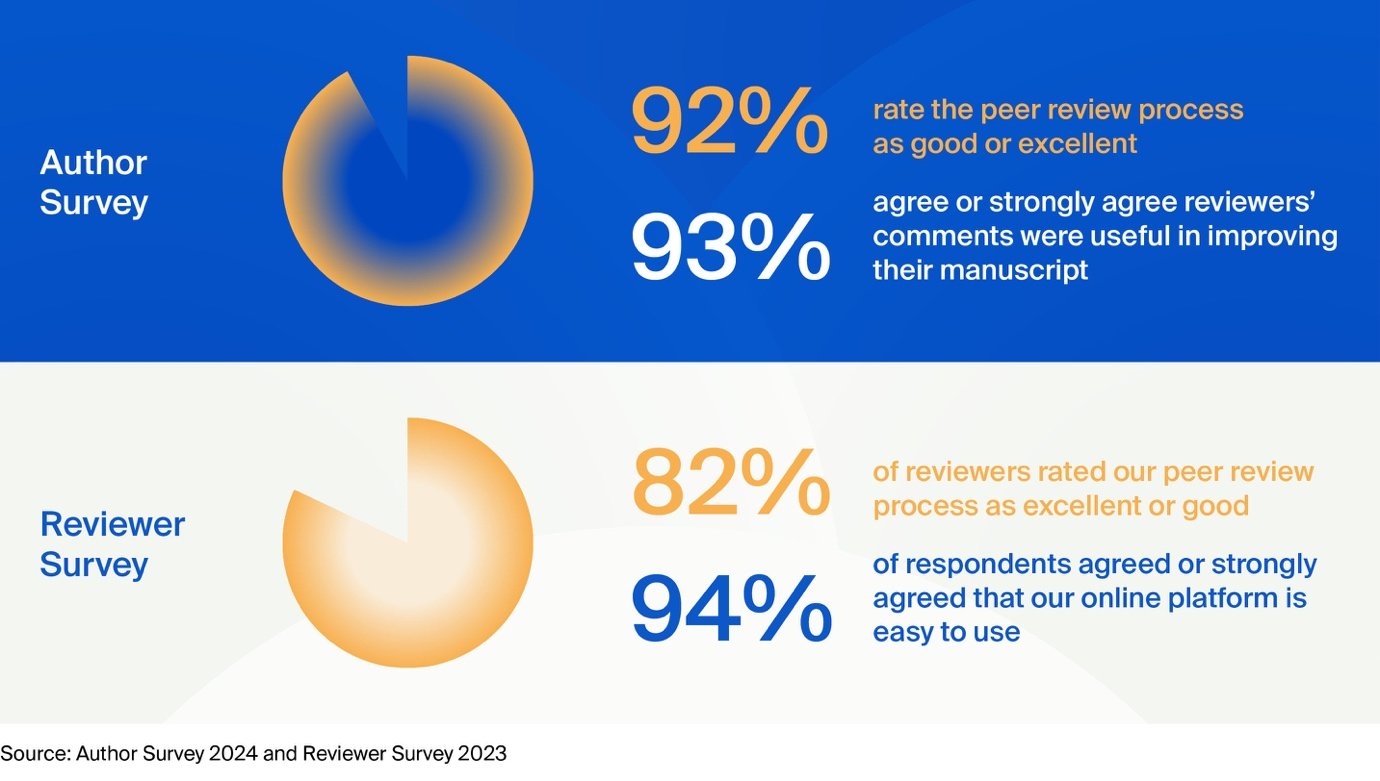
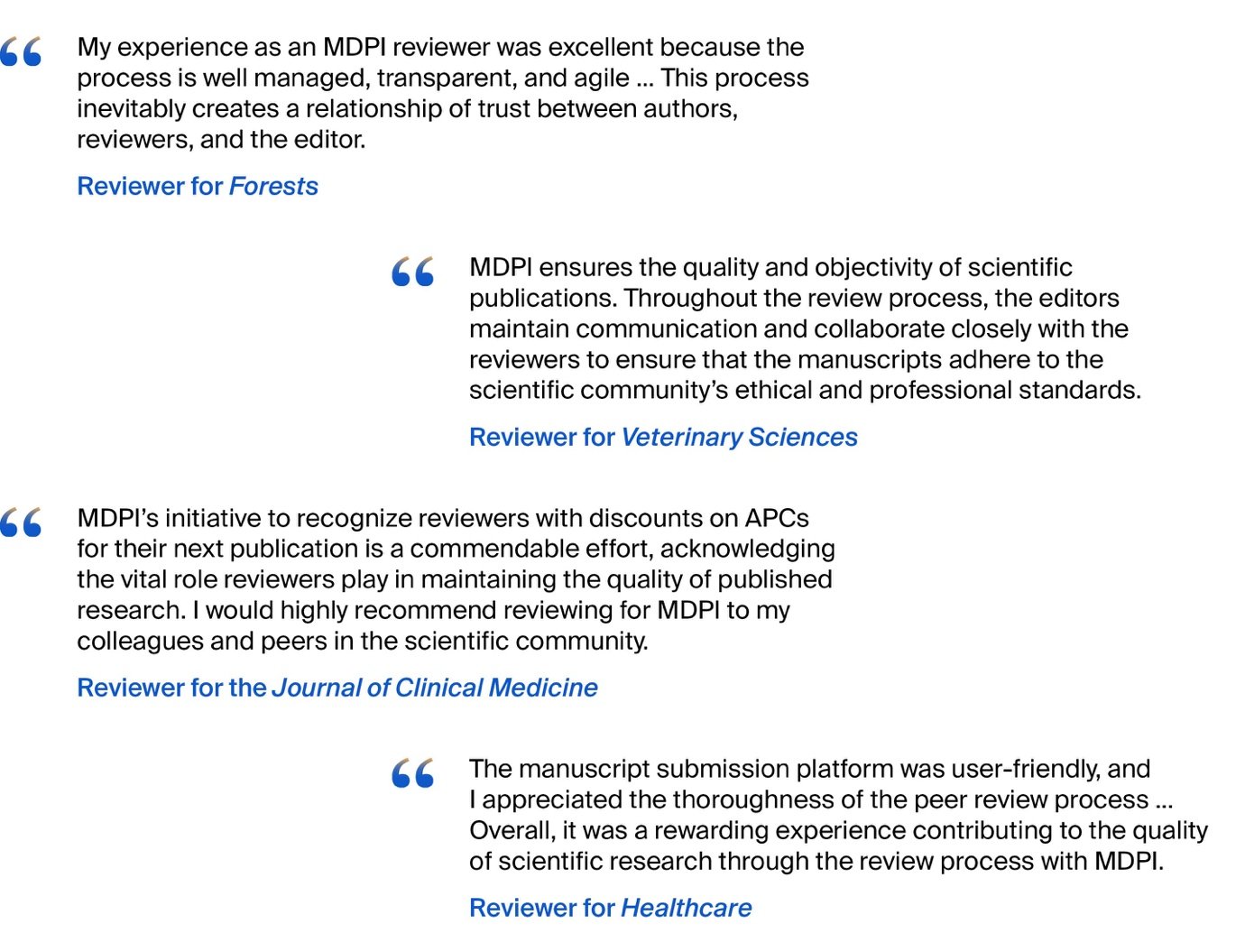
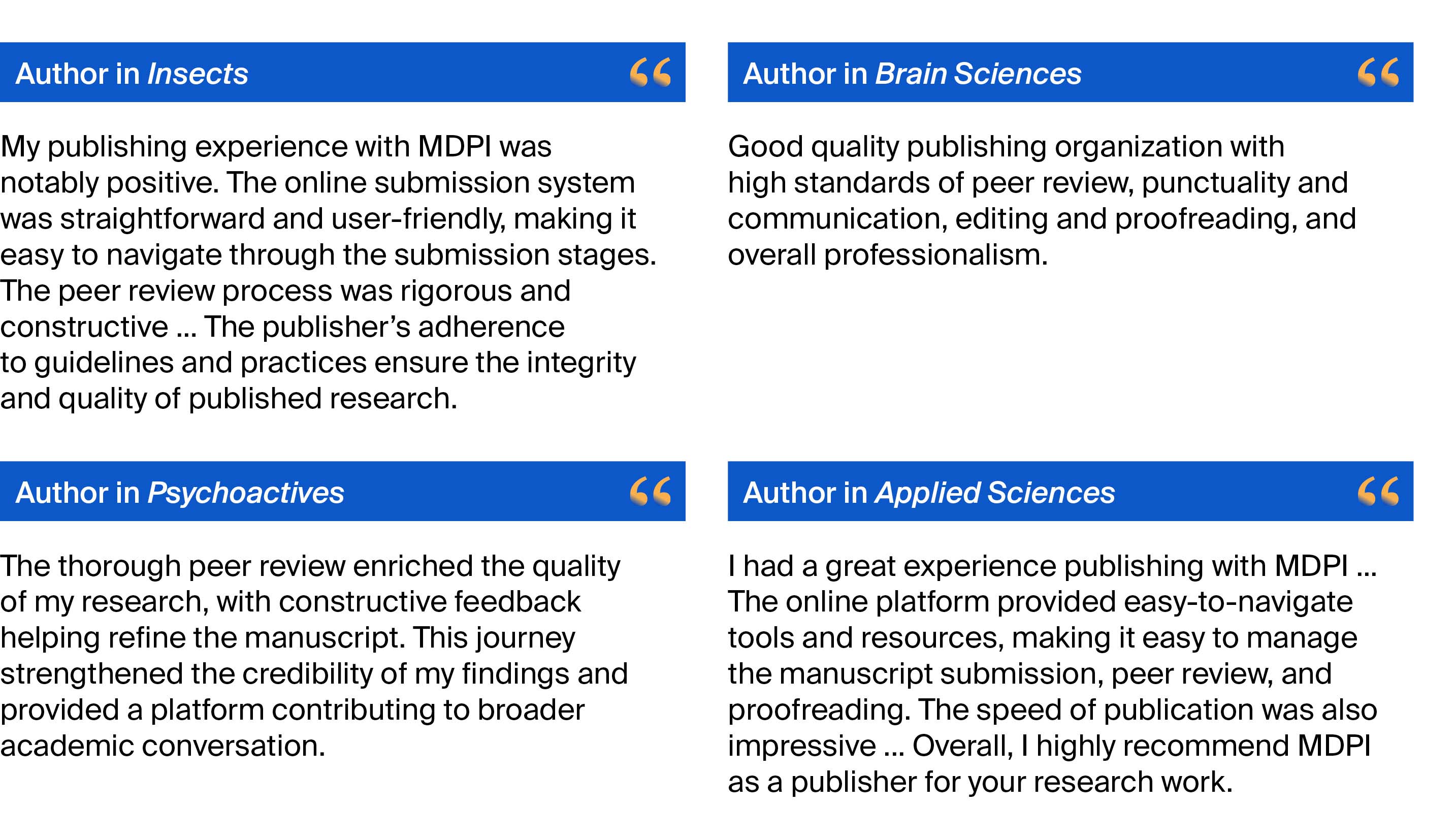
Coming Together for Science

ICM 2024 – Advances in Material Innovation
I am pleased to share that we held The 5th International Conference on Materials: Advances in Material Innovation (ICM 2024) in Basel, Switzerland this past 25–27 September.
This intimate event brought together leading scientists, researchers, and industry experts to exchange insights on recent advancements in materials characterization, processing, and manufacturing. Key focus areas included nanotechnology in material sciences and engineering, optical, electrical, and magnetic materials, soft, biological, and biomaterials, fibres, membranes, thin films, sensing materials, as well as materials and devices for energy and solar fuels. In addition, discussions featured the integration of AI and machine learning in materials research.
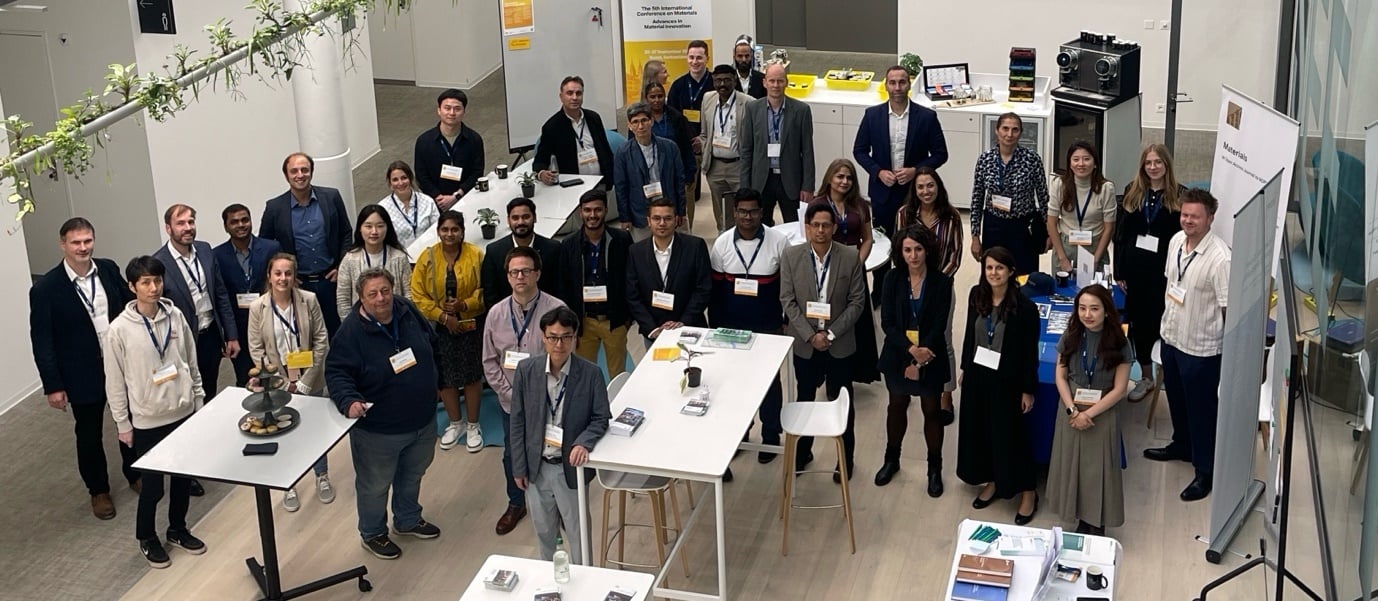
We received 90 abstract submissions. Over the course of the three-day event, 18 posters were displayed, and 34 talks were delivered, including three plenary speeches, seven invited talks, and 24 selected oral presentations.
A special thank-you to our partnering societies The Polish Membrane Society and The North American Thermal Analysis Society, as well as our sponsor, Nanomegas, for their support of the ICM conference. I am also pleased to share that we presented three awards, including the Best Presentation Award and two Best Poster Awards, recognizing the outstanding contributions of our participants.
Upcoming In-Person Event
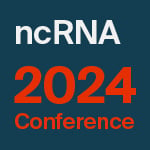
7–9 October 2024
Non-coding RNA World 2024: Exploring Mechanisms, Designing Medicines
Location: Basel, Switzerland
ncRNA 2024 will explore the latest advances in the field, covering topics from basic biology to medical and technological applications.
Find more upcoming MDPI events here.
Closing Thoughts
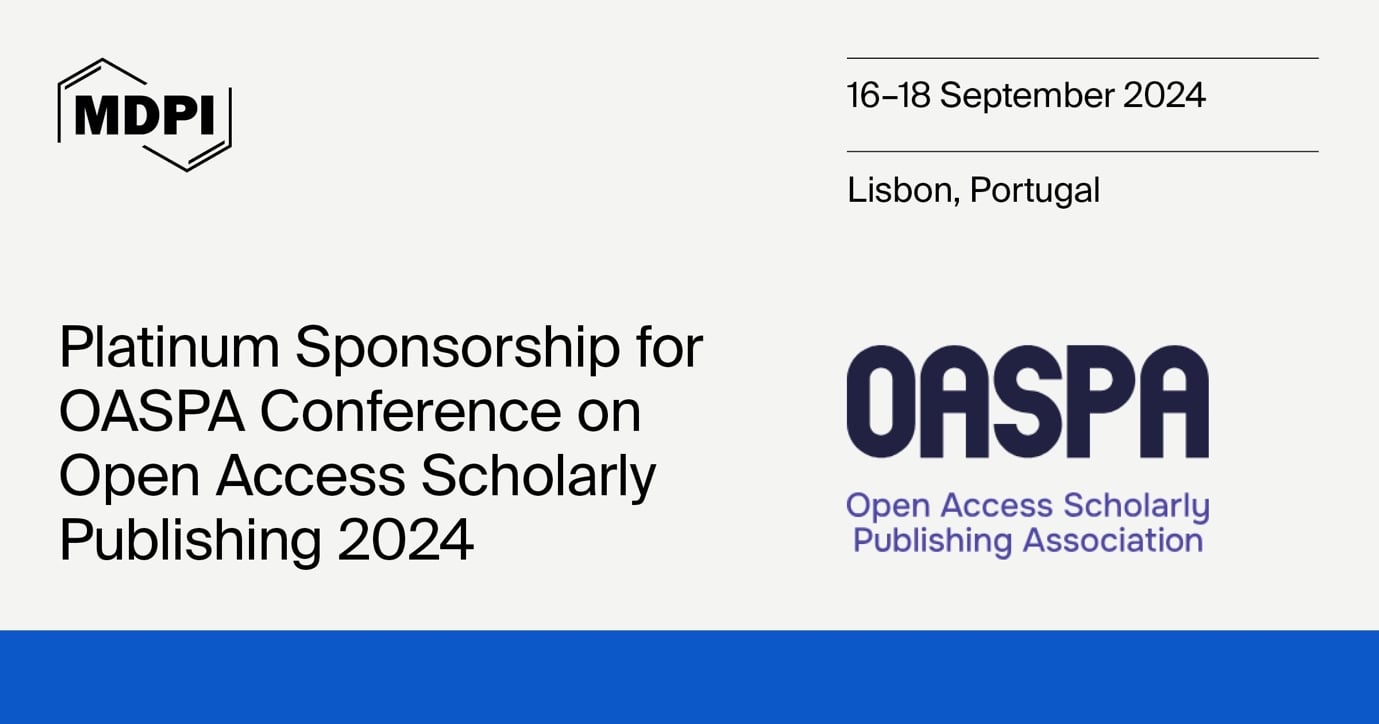
Reflections from OASPA 2024 Conference in Lisbon (16–18 September)
Amidst my September travels, I also had pleasure of attending the OASPA 2024 Conference in Lisbon from 16–18 September. It’s the first in-person Open Access Scholarly Publishing Association (OASPA) event in five years, and being in the sunny city of Lisbon made it even better! MDPI has long been a member of OASPA, and attending this conference gave us an opportunity to connect with other key members of the organization to see the latest developments in the OA movement.
“I believe that publishers have a lot to offer in terms of data and insights”
Main Themes from OASPA 2024
The main themes covered were equity and inclusivity, diamond OA, AI and openness, OA books, research integrity, and how OA can address broader societal challenges such as climate change. While it was great to see the latest developments in these areas, it was also clear that certain voices were missing, particularly those of major publishers. Although it’s not easy to incorporate every perspective, I believe that publishers, including MDPI, have a lot to offer in terms of data and insights. During the membership meeting, a few of us raised the point that large-scale publisher input could add value to these discussions.
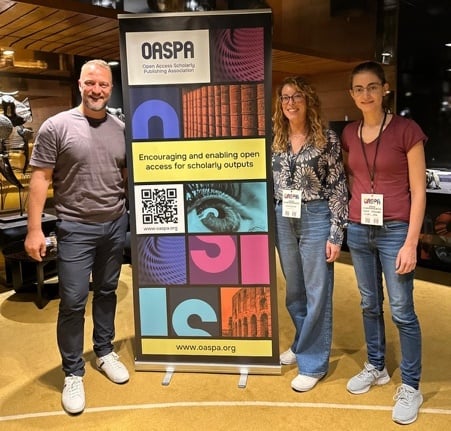
It’s important to participate in industry conferences such as OASPA in order to be part of the discussions and remain at the forefront of the OA movement.
It’s an opportunity to build meaningful relationships with organizations that share our commitment to OA.
While sponsorship is one way to show our support, it’s clear that being part of the conversation through participating in the OASPA groups and committee is what really makes a difference.
It took the last 20 years for more than 50% of the world's research to be published via open access. This provides a sobering reminder that flipping the remaining 50% will be a big challenge.
An important takeaway for me was that there is no "one-size-fits-all" solution for OA challenges: different regions and different stakeholders need different forms of support, whether it is infrastructure, funding, education, or policy, for example. I also enjoyed Rebecca Ross' presentation on how OA can drive action on climate. A few panellists shared the need for transparency in the peer-review process, advocating for open review reports, which is something we have been offering since 2014.
Speaking of openness, we are excited to celebrate Open Access Week 2024 with the scholarly community from 21–27 October. I look forward to sharing a recap of our activities in the next newsletter.
Chief Executive Officer
MDPI AG
30 September 2024
Meet Us at the Asia–Pacific Congress of Medical Virology 2024, 19–21 November 2024, Singapore

MDPI will be attending the Asia-Pacific Congress of Medical Virology 2024 held in Singapore from 19 to 21 November 2024. The Asia–Pacific Congress of Medical Virology (APCMV) is a triennial international meeting that focuses on diagnostics, public health, research and clinical virology, with emphasis on the Asia–Pacific region. The aim of this congress is to foster the collaboration and information sharing of the latest research in the field of virology pertaining to medically important viruses and treatments against them. Including the most recent COVID-19 pandemic, many emerging virus infections have been centred in the Asia–Pacific region, and the breaking down of boundaries between civilisation and wildlife only serves to accelerate that. Therefore, it is vital for countries in the region to develop a strong public health, diagnostic and research base to address these problems. Hence, the APCMV congress series was established to enable the review, sharing and discussion in each of these areas to form a strong foundation for the management of medically important viruses.
The following MDPI journals will be represented:
- Pathogens;
- Viruses;
- Antibiotics;
- TropicalMed;
- CIMB;
- Life;
- IJMS.
If you are planning to attend the conference, please visit our booth #A07. Our delegates look forward to meeting you in person and answering any questions that you may have. For more information about the conference, please visit the following website: https://apcmv.com/about-apcmv/.
29 September 2024
Prof. Mark Douglas Appointed Associate Editor of Section “Human Virology and Viral Diseases” in Viruses
We are pleased to announce that Prof. Mark Douglas has been appointed Associate Editor of the “Human Virology and Viral Diseases” Section in Viruses (ISSN: 1999-4915). With his extensive background in scientific research and publishing, he brings a wealth of knowledge and expertise to this prestigious role.
Name: Prof. Mark Douglas
Affiliation: Storr Liver Centre, The Westmead Institute for Medical Research, The University of Sydney and Westmead Hospital, Sydney, Australia
Website: https://www.sydney.edu.au/medicine-health/about/our-people/academic-staff/mark-douglas
Prof. Mark Douglas is an infectious diseases physician and molecular virologist with a strong research interest in viral hepatitis. He heads the Viral Hepatitis Pathogenesis group at the Storr Liver Centre, Westmead Institute for Medical Research. He is involved in a broad array of projects, ranging from basic molecular pathogenesis to translational and clinical research. He runs liver clinics for patients with hepatitis B and hepatitis C and also treats patients at Westmead Hospital with HIV and a range of infectious diseases.
The following is a short Q&A with Prof. Mark Douglas, who shared his vision for the journal with us as well as his views on the research area and open access publishing:
1. What appealed to you about the journal that made you want to take on the role of Associate Editor?
Viruses is a respected journal that publishes high-quality articles on virology research, with fast review and feedback. As Associate Editor, I look forward to overseeing a thorough and fair peer review process to maintain its high standard.
2. As an expert in the field of viruses, which research topics do you think are popular at present, and what does the future of this field of research look like?
I am particularly passionate about hepatitis B virus research, which has exploded after the recent success of hepatitis C virus direct-acting antivirals. There is excitement in the field about the possibility of now developing a similar cure for hepatitis B.
3. You have been collaborating with Viruses as a Guest Editor, leading multiple Special Issues. Can you share with us more about your experience as Guest Editor over the past few years?
I have had a very positive experience with the editorial team at Viruses during my time as Guest Editor. They are always friendly, responsive, and supportive. They politely remind me about outstanding tasks, while remaining flexible and respecting my other commitments. They work hard to find and follow up with appropriate reviewers to ensure high-quality peer review.
4. What do you think of the development of open access in the publishing field?
Open access publishing has provided equitable access to research findings for people around the world, particularly those who do not have access to libraries with online subscriptions. It has also expanded the number of journals and their capacity to publish articles online rapidly, providing alternatives for authors seeking to publish their research. However, it is essential to provide thorough and timely peer review of articles submitted to open access journals, to ensure they only publish high-quality research, and that the results can be trusted. I see this as a key role of an Associate Editor, and I look forward to working with the editorial team at Viruses to maintain their high standards.
We warmly welcome our new Associate Editor, Prof. Mark Douglas, and wish the journal every success in the future.




